#eastern orthodox all saints day
Text
06/30/2024 is Social Media Day 🌎, Eastern Orthodox All Saints Day ☦️, National Meteor Watch Day 🇺🇸☄️, International Asteroid Day 🇺🇳☄️

#social media day#eastern orthodox all saints day#national meteor watch day#international asteroid day
2 notes
·
View notes
Text
thought i’d share another thing i made here :’)
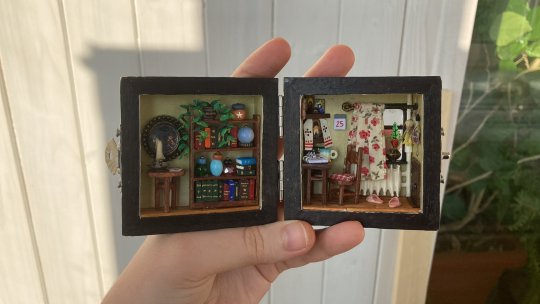
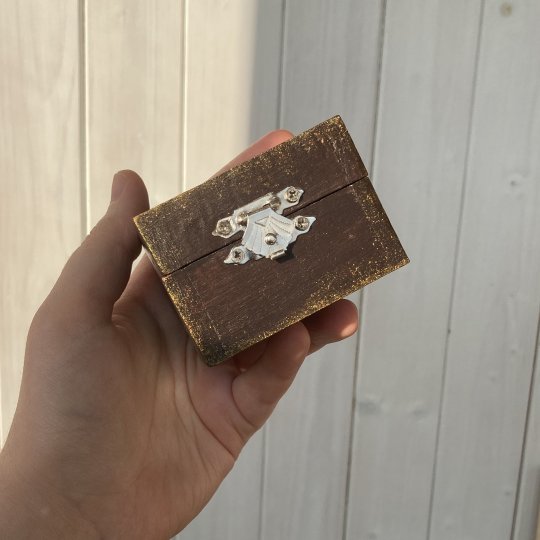
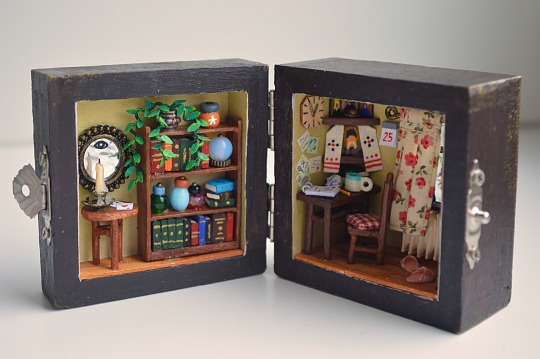
i started working on this thing back in january, as russian troops were gathering around our borders, and i got around to finishing it a couple months later, after they retreated from kyiv and my lucky family and i were able to get back home.
for half of the process i was asking myself, “is making this even worth it if it’s going to be bombed to ashes in a couple of weeks?” (the answer was yes); for the other half, i was asking myself how and why do you even make a house now that there are dead and gutted houses all around (the answer was “well, what else is there to do anyway”).
was aiming for the “small ukrainian granny’s apartment” vibe with soviet era “ugly 70s brown” color furniture and a bit of a witchy/magical realism touch :’) details + a bit of ukrainian folk trivia below!
featuring:
a little pot with a star in it, because stealing stars from the sky and storing them in pots for their evil little purposes is a classic ukrainian witch thing;
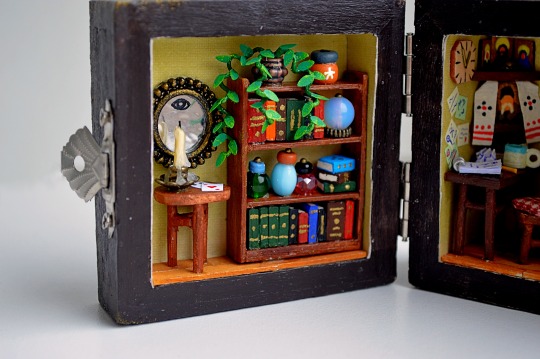
eastern orthodox icons, because every respectable ukrainian granny has those in her house + massive church-sanctioned witch hunts were never really a thing in ukraine and a witch is likely to have as amiable a relationship with god and saints and angels as with chorts (demons);
portrait of taras shevchenko, adorned with a rushnyk, because, again, can not be a proper granny apartment without those;
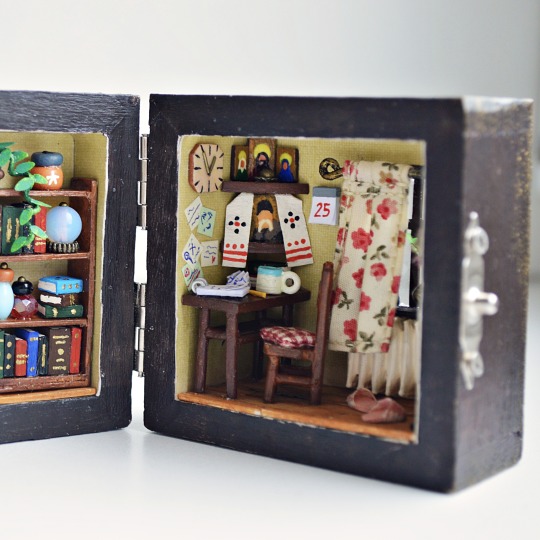
a blooming fern, because fern bloom is a Thing in ukrainian folklore (leads you to a hidden treasure, protects you from evil magic, brings you good luck, all that stuff);
a calendar booklet. it has recipes, farming + (dubious) medical advice, lame granny jokes, and shows February 25, because we’re still stuck in February 24 and hoping for the next day to arrive;
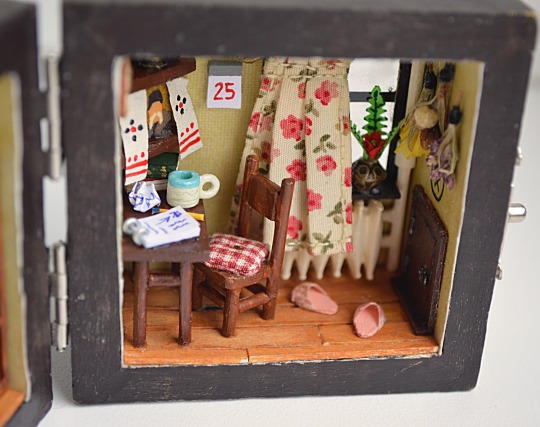
a mysterious tiny door. that rune means “heritage,” and i thought that a witch’s inheritance would warrant a little spooky door to keep it safe (also, our heritage is precisely what russia is trying to take away from us right now, so the concept has a special meaning to me);
fashionable pink slippers!
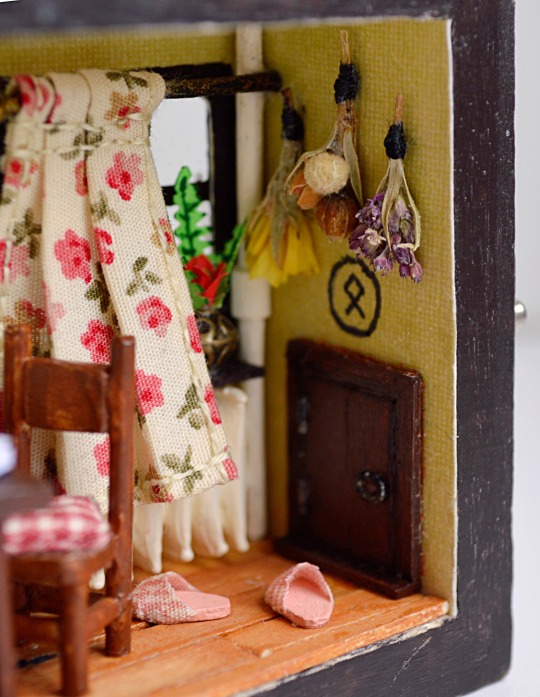
bonus: a CREATURE


#mari makes#miniature#diorama#ukraine#witch#ukrainian folk#ukrainian art#taras shevchenko#rushnyk#lots of tags bc i want attention
20K notes
·
View notes
Text
“Stojan Adasevic, a Serbian abortionist when Serbia was still a communist country, managed to kill 48,000 children in utero in his 26 years as a purveyor of death.
Sometimes up to 35 per day.
But that's all on the past, as Stojan is now one of Serbia's most important pro-life voices.
As explained in a recent interview with the Spanish daily newspaper, La Razon:
The medical textbooks of the Communist regime said abortion was simply the removal of a blob of tissue. Ultrasounds allowing the fetus to be seen did not arrive until the 1980s, but they did not change his opinion. Regardless of what he believed, or thought he believed, Stojan began to have nightmares.
In describing his conversion to La Razon, Adasevic "dreamed about a beautiful field full of children and young people who were playing and laughing, from four to 24 years of age, but who ran away from him in fear. A man dressed in a black and white habit stared at him in silence. The dream was repeated each night and he would wake up in a cold sweat.
One night Stojan asked the man in black and white in his frightening dream as to his identity.
"My name is Thomas Aquinas," he responded. Stojan, educated in communist schools that pushed atheism instead of real learning, didn't recognize the Dominican saint's name.
Stojan asked the nightly visitor, "Who are these children?"
"They are the ones you killed with your abortions," St. Thomas told him bluntly and without preamble.
Stojan awoke in shock and fear. He decided he would refuse to participate in any more abortions.
Unfortunately, that very day in which he made his decision, one of his cousins came to the hospital with his four months-pregnant girlfriend―they had hoped for an abortion. Apparently, it wasn’t her first which is not uncommon in countries of the Soviet bloc.
Stojan reluctantly agreed, but, instead of the usual Dilation and Curettage (D&C) Method in which the fetus is torn apart with the use of a hook shaped knife called a curette, he decided to chop it up and remove it as a single mass.
Horrifically and providentially, his little cousin's heart came out still beating.
It was then that Dr. Adasevic realized that he had indeed killed a human being.
Stojan immediately notified his hospital that he would no longer perform abortions.
No physician in communist Yugoslavia had ever before refused to perform an abortion. The hospital and government's reaction was swift and severe.
His salary was cut in half and his daughter was immediately fired from her job. In addition, Stojan's son wasn't allowed to matriculate into the state university.
After many years of surviving the many privations orchestrated by pro-abortion/pro-death fundamentalist atheist government, Stojan was about to buckle under the pressure and give into its demands.
Fortunately, Stojan had another dream about St. Thomas.
St. Thomas assured Stojan of his friendship and Stojan was in turn inspired.
The physician became involved in the pro-life movement in Yugoslavia. In fact, he was able to get the state-run Yugoslav television station to twice broadcast Bernard Nathanson's anti-abortion film The Silent Scream.
Since then, Stojan has told of his anti-abortion stance and his reversion to the Orthodox faith of his childhood to newspapers and television stations throughout Eastern Europe. In fact, he has a strong devotion to St. Thomas Aquinas and is rarely, if ever, without the saint's books―his constant reading material.
Stojan often reminds his listeners that in his Summa Theologiæ, St. Thomas wrote that human life begins forty days after fertilization. Perhaps, Stojan would opine, "the saint wanted to make amends for that error."
Today Stojan continues to fight for the lives and rights of the unborn.”
234 notes
·
View notes
Text
Back in December, re-reading some of Omega Red's older appearances, I started wondering about the name the Soul Skinner calls him here in this panel of X-Men 18:
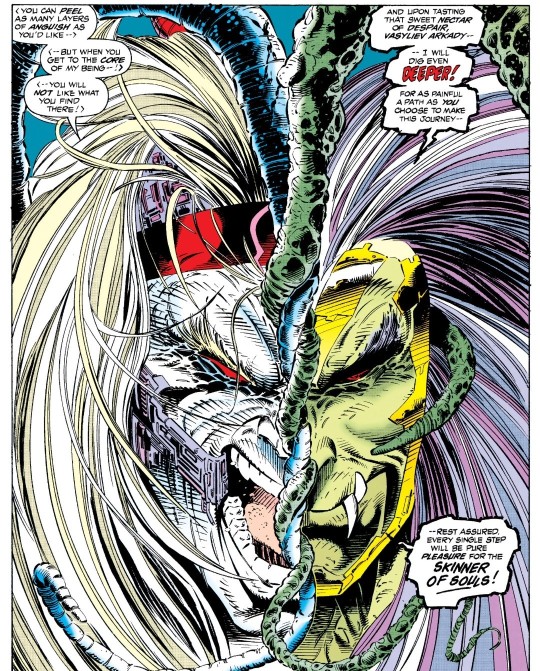
Vasyliev Arkady. His human name has been given alternatively as Arkady Grigorievich or Arkady Rossovich, but Russian names have three parts, not just two: Given Name, Patronymic, and Family Name. Technically, Grigorievich/Rossovich would not be equivalent to his last name. EDIT: I wasn't able to resolve the mystery of why the Soul Skinner would call Arkady "Vasyliev" Arkady. The closest I could figure out was that it might actually be Arkady's surname (third name), since it can be either a patronymic or a surname. It might also have been meant as an insult, since calling someone only by their surname is how inferiors were traditionally referred to, or how a teacher might address a student, or ironically as in some modern usage.
Which then led me to wondering how his first name would have been chosen?
Russian first names are, or often were, chosen from Greek Orthodox tradition or pre-Christian Slavic names. Arkady is from the Greek "Arcadia" and there was a Russian saint in the Greek Orthodox Church, Arkady or Arkadios of Novotorsk from the 1600s whose saint's days are June 11th, July 11th, and August 14th.
Now I started to get curious about what kind of natal horoscope would Arkady Grigorievich/Rossovich have?
Buckle in with your drinks and snacks, because this is going to be a bit of a ride...!
Given that his first appearance was in 1992 and it's been stated several times he was in cryogenic stasis for 30 years; that Wolverine stated his team's operation to sabotage Omega Red's program was in the early 1960s; and that Arkady would have likely been in his early-to mid 20s at the oldest the time (likely entered military service at 18 if not earlier - this wasn't uncommon back before networked records, and his abilities would have likely been discovered pretty soon thereafter) gave me a rough likely timeframe of 1936-1943ish to consider for his birth year.
Western astrology doesn't give much importance to, or assign characteristics to, the year of birth, but Chinese/Eastern astrology does. Here's the breakout of the animal zodiac signs for each year in that range:

There's a lot of background I'm going to skip over here for the sake of brevity in what's already a long post, but from a thematic point as well as a likely age point, having a heavenly branch element of metal makes a certain amount of sense, not to mention the personality and characteristics usually ascribed to Dragon or Snake.
This was really a tough call, because with all the force of his personality, you might initially think Yang Metal Dragon is the logical choice for birth year. Both Metal Dragon and Metal Snake are ascribed similar traits of unyielding strength and resolve, really a lot similar between both of them for Arkady's observed traits. What really clinched it for me as his most likely birth year (again, following astrology's ascribed characteristics purely for fun) was the nature of Yin Metal Snakes being described as emotionally distant, suspicious, and absolutely undying in either loyalty or hatred for betrayal. THAT sounds like Omega Red to a T!
So 1941, likely in June, July, or August. Let's turn back to the Western zodiac for his sun sign - those mid-month dates give us the likely choices of Gemini, Cancer, or Leo:
Gemini
Flexibility, balance and adaptability describe the Gemini personality. Their responses can be difficult to predict and they may be prone to mood swings, but they can also be generous, affectionate and imaginative.
Cancer
Cancer people are traditionalists, loving a simple home life. They will usually be composed, but that hides a turmoil of moods going on under the surface. They are easily hurt and can be prone to depression, but they are loyal, sympathetic friends and carers.
Leo
Leo people are exuberant and powerful. Born leaders, they won’t hesitate to let you know what they think and that they are right. Which they usually are. They can be brave and intuitive, but may come across as pushy and overbearing. Their bossiness often hides a sensitive soul and an underlying insecurity.
Oh, our boy is HELLA a Leo, then. Hands down, no question!
So in combination with his official biography on Marvel.com giving his birthplace as Novorossiysk, with an assumed birthdate of August 14th, 1941, and after a little adjusting time of birth for rising sign, his natal chart looks like this, courtesy of Astrolabe:

Rising Sign is in 15 Degrees Scorpio
You tend to be quiet, reserved, secretive and, at times, quite difficult to understand. Others notice your deep emotions and feelings and wonder how to draw you out. Stubborn and tough, you fight for any position you believe in. You are very resourceful and formidable when you become angered or upset about something. You enjoy living life at the cutting edge -- for you life must be experienced intensely and totally. Quite courageous, you are willing to take calculated risks. Easily hurt by others, you often strike back with bitter sarcasm. Sensitive and curious, you are concerned with the deeper mysteries of human psychology. Once you have become interested in any subject, you pursue it with total fanaticism.
Sun is in 21 Degrees Leo
More than a bit of a showoff, you love to be the center of attention! But others do not usually mind because they tend to enjoy your genuine warmth and affection. Very spirited and willful, proud and self-important at times, you demand your own way. You are quite honest, however, and the respect of others is very important to you. You never compromise yourself and you pursue your goals with persistence and dedication. Your regal presence and demeanor draws you to positions of leadership and authority. But beware of being overly hardheaded, domineering, ostentatious or patronizing or you will lose the goodwill and admiration that you enjoy. Very theatrical, you live life on a grand scale wherever and whenever possible. Your strength and energy vitalizes those who come in contact with you.
Moon is in 14 Degrees Taurus
Warmth, comfort, security and familiar surroundings are necessary for you to feel at ease. Very loving and affectionate, you prefer a steady, patterned way of life. Patient, calm and steadfast, you are not easily upset. Others look to you for support. You tend to be a slow starter and a slow mover -- others may try to rush you, but they will never succeed. Emotionally, you are quite stubborn -- your attitudes about people and things were firmly set in your youth and will change very little as an adult. You are also very cautious and conservative about spending money. It is not that you are selfish, you just need to feel secure. Beware of a tendency to become overly complacent and too self-satisfied.
Mercury is in 16 Degrees Leo
You are usually quite convinced that your own ideas are correct and you enjoy persuading others that they are. At times, you are very stubborn and proud of your beliefs and principles, and you get very defensive when they are challenged. You appreciate truth and honesty -- you practice it yourself and expect it in others. You have good talent for organizing, directing and planning. You delight in being asked for your advice and counsel.
Venus is in 22 Degrees Virgo
You express your love and affection through selfless service to people or causes. You have a tendency to underestimate yourself and doubt your self-worth. This is very demeaning and should be avoided -- learn to love yourself as well as you do others. Your standards of perfection are very high -- you are attracted to relationships based on duty and responsibility. You are supercritical of yourself and others and, at times, prefer to be alone rather than deal with any imperfections in yourself or in those with whom you might relate.
Mars is in 20 Degrees Aries
You are very independent and self-assertive, and you have lots of physical energy. You are not satisfied unless you can be the first to do something. As such, you are more comfortable in leadership positions than you are as an underling. When you are challenged by anyone for anything, you delight in the competitive process and will fight long and hard for your beliefs. You are bold and courageous and often act without thinking. At times, in your zeal to get ahead, you are tactless and offensive -- learn that cooperation with others can often bring you nearer to your goals quicker because of the support you will get.
Jupiter is in 16 Degrees Gemini
You have a logical, detached, objective view of most things. Your interests are wide-ranging and you are an avid student, with expertise in many different areas. You love to work things out in your mind -- everything you do is reduced to an exercise in logic and reason. You have the ability to grasp abstractions and to deal successfully with the larger issues of life. Your overemphasis on developing your powerful intellect can cause your emotional and intuitive abilities to atrophy unless you consciously choose to exercise them.
Saturn is in 27 Degrees Taurus
Complete freedom of choice makes you ill at ease. You must have a firm, ordered, secure foundation in your life in order to feel comfortable. You do not adapt easily and tend to fear the new and untried. You constantly fear that you do not have enough (love, property, material things, etc.) and this makes you tend toward being selfish, withdrawn and stingy. If you try to surround yourself with supportive people in your environment, you will become more emotionally self-supporting.
Uranus is in 00 Degrees Gemini
You, and your peer group as well, are attracted to new, unusual and revolutionary thoughts, ideas and lifestyles. You prefer abstract, idealistic solutions to practical, immediately useful answers. You delight in communications, the mass media, electronics, computers and all sorts of gadgetry.
Neptune is in 26 Degrees Virgo
You, and your entire generation, idealize work, duty and responsibility. You tend to be very fearful of anything that would force you out of the protective shell of your everyday routines. You place a high premium on personal pride in productivity and craftsmanship. But in your search for perfection in minor details, you sometimes lose track of the overall purpose of life.
Pluto is in 04 Degrees Leo
For your entire generation, this is a time when the relationship of the individual to society as a whole is being thoroughly re-examined. Major attempts will be made to find a balance between the need to be self-sufficient and the need to honor debts of social commitment.
Happy birthday (maybe?) Omega Red/Arkady Rossovich!
N. Node is in 23 Degrees Virgo
You're usually quite at ease in leaving leadership roles in the hands of others. You would rather tend to the thousand and one details that need to be accomplished to keep any group going. Although you're very fussy and high-minded when it comes to choosing your associates, once your loyalty is given you can be trusted with many of the practical aspects of any project that is being undertaken. Usually quite unselfish, you will toil long hours in the service of any worthy cause that demands your attention. But be careful that your perfectionist tendencies don't get in the way of making real progress. (In other words, don't waste your time dusting clean shelves!)
If you made it all the way to the end of this post, thanks for reading! This was a real labor of love for one of my favorite characters in any fandom, I hope you enjoyed the journey.
#omega red#arkady rossovich#omegared#arkadyrossovich#x men#x force#marvel comics#character analysis#horoscopes
11 notes
·
View notes
Text
Countries that are no more: Republic of Venice (697AD-1797AD)
The first in a series I hope to feature on providing high level overviews of countries that existed and were influential to history or obscure and lost to most memory in time. The first up is the Republic of Venice.
Name: Serenisma Republega de Venesia (Venetian). In English this translates to the state's official name The Most Serene Republic of Venice. Also referred to as the Venetian Republic, Republic of Venice or just Venice.
Language: The official languages were the Romance languages of Latin, Venetian & later Italian. The regional dialect of Vulgar Latin in Northeastern Italy known as Veneto was the original language of Venice. This evolved in Venetian which was attested to as a distinct language as early as the 13th century AD. Venetian became the official language and lingua franca of the everyday Venetians and across parts of the Mediterranean although Latin would still be used in official documents and religious functions. Overtime, modern Italian was spoken in Venice though the Venetian language remains technically a separate language in Italy's Veneto region and the surrounding areas to this day.
Minority languages across the republic's territory included various Romance languages such as Lombard, Friulian, Ladin, Dalmatian and non-romance languages such as Albanian, Greek & Serbo-Croatian.
Territory: The republic was centered on the city of Venice founded in the Venetian lagoon on the north end of the Adriatic Sea to the northeast coast of the Italian peninsula. It also included the surrounding regions of mainland northeast Italy in the regions of Veneto and Friuli and parts of Lombardy. This became known as the terraferma or the mainland holdings of the republic. It also possessed overseas holdings in modern day Croatia, Slovenia, Montenegro, Albania, Greece & Cyprus.
Symbols & Mottos: The main symbol of Venice was its flag which had the famed Winged Lion of St. Mark. This represented the republic's patron saint, St. Mark. Mark the Evangelist after whom the Gospel of Mark in the New Testament in the Bible is named. Mark's body and holy relics were taken by Venice and said to be housed in the Basilica di San Marco (St. Mark's Basilica) in Venice itself. Variations of this flag differed during times of peace & war. During peace the winged lion is seen holding an open book and during war flags depicted the lion with its paw upon a bible and an upright sword held in another paw.
The republic's motto in Latin was "Pax tibi Marce, evangelista meus" or in English "Peace be to you Mark, my evangelist."
Religion: Roman Catholicism was the official religion of the state but Venice did have minorities of Eastern Orthodox & Protestant (usually foreign) Christian denominations at times in its territory and it also had small populations of Jews and Muslims to be found in Greek and Albanian territories during the wars with the Ottoman Empire.
Currency: Venetian ducat and later the Venetian lira.
Population: Though population varied overtime for the republic due to a variety of factors such as war & changing territory and disease & its subsequent effects. There was rough population recorded of 2.3 million people across all of its holdings in the mid sixteenth century (circa 1550-1560). The vast majority of its population was found in the terraferma of northern Italy and the city of Venice itself with its concentrated population on the islands within the Venetian Lagoon. The Greek island of Crete and the island of (Greek speaking) Cyprus were the most populous overseas possessions of the republic's territory. The rest of the population was found its various holdings in the Balkans mostly along the Adriatic coastline.
Government: The republic followed a complex mixed model of government. Essentially it could be characterized as a mixed parliamentary constitutional republic with a mercantile oligarchy ruling over it in practice. It had no formal written constitution, and this led to a degree of evolution without exactly defined roles often in reaction to happenings in its history. The resulting government became more complex overtime as institutions became increasingly fragmented in their size, scope and duties, some almost obsolete but still retained and others not fully defined. Yet, the republic managed to function quite well for most of its history. It incorporated elements of oligarchy, monarchy & limited democracy.
It's head of state and government was known as the Doge which is akin to the term of Duke. Though this similarity of name ends there. The Doge was neither similar to a duke in the modern sense nor was it meant as a hereditary position. The doge was rather a lifetime appointment much like the Pope for the Roman Catholic Church. Furthermore, doges were elected by the ruling elite of Venice, namely its wealthy oligarchy merchant class. The doge didn't have well defined & precise powers throughout the republic's 1,100-year history. It varied from great autocracy in the early parts of the republic to increasing regulation and restriction by the late 13th century onward. Though the doge always maintained a symbolic and ceremonial role throughout the republic's history. Some doges were forcibly removed from power and post-1268 until a new doge could be elected, the republic's rule transferred to the most senior ducal counsellor with the style of "vicedoge". After a doge's death following a commission was formed to study the doge's life and review it for moral and ethical transgressions and placed judgment upon him posthumously. If the commission found the deceased doge to have transgressed, his estate could be found liable and subject to fines. The doge was given plenty of ceremonial roles such as heading the symbolic marriage of Venice to the sea by casting a marriage ring into the sea from the doge's barge (similar to a royal yacht). Additionally, the doge was treated in foreign relations akin to a prince. It's titles and styles include "My Lord the Doge", "Most Serene Prince" and "His Serenity". The doge resided in the ducal palace (Palazzo Ducale) or Doge's Palace on the lagoonfront in Venice next St. Mark's Basilica and St. Mark's Square.
While the doge remained the symbolic and nominal head of the government, the oligarchy remained supreme overall. The supreme political organ was the 480-member Great Council. This assembly elected many of the office holders within the republic (including the doge) and the various senior councils tasked with administration, passing laws and judicial oversight. The Great Council's membership post 1297 was restricted to an inheritance by members of the patrician elite of the city of Venice's most noble families recorded in the famed Golden Book. This was divided between the old houses of the republic's earliest days and newer mercantile families if their fortunes should attain them property ownership and wealth. These families usually ranged between 20-30 total. They were socially forbidden from marrying outside their class & usually intermarried for political and economic reasons. Their economic concerns were chief to the whole of the republic and most centered on Eurasian & African trade throughout the Mediterranean Sea's basin. Members of these families served in the military and eventually rose to prominent positions of administration throughout the republic.
The Great Council overtime circumscribed the doge's power by creating councils devoted to oversight of the doge or executive and administrative functions (similar to modern executive cabinets or departments) whereas the doge became more and more a ceremonial role. The also created a senate which handled daily legislation. They also created a Council of Ten set to have authority over all government action. Other bodies were formed from this Great Council and others overtime. This resulted in intricate and overlapping yet separate bodies which found themselves subject to limitations with various checks on virtually each other's power. Essentially running as committees or sub-committees with checks on another committee's powers. These bodies weren't always completely defined in their scope and overtime their complexity led to battles to limit other's power (with limited success) along with gradual obsolescence and sometimes slow grinding administration.
Military: The military of Venice consisted of a relatively small army and a powerful navy. The famed Venetian Arsenal in Venice proper was essentially a complex of armories and shipyards to build and arm Venice's navy. The arsenal in Venice has the capacity to mass produce ships and weapons in the Middle Ages, centuries before the Industrial Revolution allowed for modern mass production in economic and military applications. Venice's military was designed towards protecting it possessions both in Italy and its overseas territories. The primary concern was to secure Venice's trade routes to the rest of Europe as well as Asia & Africa. It faced opponents' overtime ranging from the Franks, the Byzantine Empire, Bulgarians to other Italian city-states, France, Austria, the Ottoman Empire and Barbary Corsairs along with European pirates in the Adriatic and Mediterranean. It played key roles as a naval transport in other powers including throughout the Crusades. It also played a key role in the infamous Fourth Crusade which culminated in the Sack of Constantinople in 1204 AD, an event which fractured the Byzantine Empire into a half-century of civil war between successor states before a weakened revival in the mid 13th century. The Byzantine Empire would linger until the 15th century when the Ottoman Empire finally conquered its last remaining portions. Many attribute this loss to in part to its weakness still resulting from that 1204 sack lead by Venice. The Venetian military would exist until the republic's end when The French Republic's Army of Italy under Napoleon Bonaparte conquered the republic, a conquest in which the Venetians surrendered without a proper fight.
Economy: Venice's economy was based largely in trade. Namely control over the salt trade. Venice was to control salt (preservative of food) production and trade throughout the Mediterranean. It also traded in commodities associated with the salt trade routes to Eurasia and Africa. These commodities could include other foodstuffs (grains, meats & cheeses), textiles & glassware among other items.
Lifespan: 697AD-1797AD. Though the exact founding of Venice itself hasn't been determined. It is traditionally said to have taken place in the year 421 AD. At a time when Roman citizens in northeast Italy were escaping waves of Germanic & Hunnic barbarian invasions that contributed to the collapse of the Western Roman Empire. The going theory is that these Romans evaded barbarian attacks by building their homes in the Venetian Lagoon by hammering wood stakes to form a foundation which sunk into the muddy shallows and petrified. Upon which they built their homes and created a cityscape marked by streets and canals interlaced. Venice remained a community of fishermen and merchants and was nominally under the control of the surviving Eastern Roman Empire (Byzantine Empire). It avoided barbarians overrunning the land but also was removed enough from Constantinople that it was relatively autonomous and became strategically important as a port. Other islands in the lagoon also banded together with Venice in a loose confederation of sorts by the 6th and 7th centuries which increased economic productivity and security for the city. The first doge was said to have been elected in 697 AD under the name Paolo Lucio Anafesto, though there is dispute about his historicity. Anafesto supposedly ruled until 717 AD. This is traditionally regarded as the foundation of the Republic of Venice.
Venice's third doge was Orso Ipato who reigned from 726-737 and he is the first undisputed historically recorded doge whose existence was confirmed. Orso also known as Ursus was known to strengthen the city's navy and army to protect it from the Lombard Germanic invaders who had overrun and ruled Italy by that time. Though nominally part of the Byzantine Empire, by 803, the Byzantine Emperors are said to have recognized Venice's de-facto independence. Though this view is disputed somewhat, it nevertheless remained virtually independent until its collapse in 1797.
Venice also partook in the slave trade of non-Christian European populations from Eastern Europe and transferred them to North Africa, selling them to the Arab and Berber (Moors) of the Islamic world.
As the 9th century progressed, the Venetian navy secured the Adriatic and various trade routes by defeating Slavic and Muslim pirates in the region. The Venetians also went onto battle the Normans who settled in southern Italy and Sicily in the 11th century.
Venice provided naval transports for Crusaders from Western Europe starting with the successful First Crusade.
The High Middle Ages (1000AD-1350AD) saw the wealth and expansion Venice increase dramatically. However, over this period Venice gradually came into mixed relations with its former ruler the Byzantine Empire. The Byzantine Empire endured corruption, civil war and foreign invasion which saw it alternate between periods of waning power and restored power. Venice provided the Byzantines with an increased naval force when needed and many trading commodities. In exchange for this, Venice was granted trading rights within Byzantine territory and a place within the "Latin Quarter" for Western Europeans in Constantinople. The Byzantine populace though calling themselves "Romans" having taken on the political & cultural institutions of the Roman Empire which lived on in the East long after the Western half's collapse, were in fact mostly Greek by ethnicity, language and culture. Their religion was the Eastern Orthodox or Greek Orthodox branch of Christianity which was often at odds with Roman Catholics of Western Europe. Resentment at the religious and cultural differences along with the economic displacement the Venetians and other Italian merchants from Genoa & Pisa had caused in Constantinople's maritime & financial sectors contributed to the 1182 "Massacre of the Latins" in which the Byzantine Greek majority of the city rioted and slaughtered much of the 60,000 mostly Italian Catholics living within the city. Thousands were also sold into slavery to the Anatolian Seljuk Turks.
This event lingered in Venice's memory as its trade in the city was reduced for awhile. Though trade resumed between the Byzantines and the West again shortly thereafter, the event soured the perception of the Greeks to Western Europeans. This along with a subsequent power struggle for the throne of the Eastern Roman Emperor fell into Venice & Western Crusader's hands in 1202. Looking to originally ferry Western Crusaders to the Levant against the Islamic Ayyubid Sultanate of Egypt & Syria. Events transpired that devolved into Venice conspiring under its doge Enrico Dandalo along with other Western leaders and a Byzantine claimant to the throne that resulted in the first successful sacking of Constantinople in 1204. The city was ransacked, some Greek citizens murdered by the Crusaders & classical works of art destroyed or looted (most famously the four bronze horses of St. Marks in Venice) and politically, the Byzantine Empire would be temporarily fractured between competing Greek dynasties while the Crusaders along with Venice created the short-lived Latin Empire, which controlled Constantinople and its environs while Venice also acquired Greek territories which it was to hold for centuries. Venice also came into conflict with the Second Bulgarian Empire at this time as its support of the Latin Empire of Constantinople encroached on the Bulgarian's land. Eventually by the mid 13th century the Latin Empire (never fully stable) collapsed, and the Byzantine Empire was restored until the mid-15th century but forever weakened as a result of the 1204 sacking of its capital.
Venice reached trade deals with the Mongol Empire in 1221. As the century wore on, it also engaged its rival in Western Italy Genoa in some warfare.
The 14th century is generally regarded as Venice at its peak as it faced down Genoa in a number of battles and came to be the most dominant trading power in the Mediterranean, though it was impacted by the Black Death plague. Nevertheless, into the 15th and even 16th centuries, it partook in a number of wars which saw it gain territory on the Italian mainland, establishing its terraferma domain.
By the 16th late 15th and into the 16th century new threats had emerged such as the Turkish Ottoman Empire. The Ottoman capture of Constantinople in 1453 is seen as the end of the Middle Ages as the last political vestiges of the Roman Empire vanished from the world stage. However, a number of Byzantine Greeks escaped on Italian ships during the conquest of the city and others escaped Greece in subsequent years. These refugees brought with them artistic and cultural heritages that reemphasized the classical forms of Ancient Greece and Rome and lead to the Italian Rennaisance in art & other forms of culture. Ideas which emphasized humanism and spread to elsewhere in Europe overtime.
While there was a cultural flourishing in Venice and elsewhere due to the Rennaisance. There was also the first signs of economic and political decline as well from the 16th century onwards. The Ottoman dominance in the Eastern Mediterranean meant the traditional trade routes to the East were cut off by an often-hostile Muslim power. Additionally, other maritime powers in the West namely Spain & Portugal had recently begun exploring the continents of South & North America and in time France, England & the Netherlands would join in them. This decline in Eastern trade and the newfound trade routes dominated by other European states in the Americas and Asia (by way of rounding Africa) would render trade with Venice gradually obsolete. Venice would still maintain what trade it could in the Mediterranean, but it also focused on production and placed increasing importance on its Italian mainland possessions rather than just its declining position overseas in Greek territories, including the loss of Cyprus to the Ottomans in 1571. Though the Venetian navy with other Christian powers won the notable naval victory against the Ottomans in 1570 at Lepanto.
It was also involved in the Italian Wars between various rival city states and the power struggle between the Papacy, France and the Hapsburg realms of the Holy Roman Empire and Spain.
Other factors that impacted the declining trade in the 17th century included an inability to keep up in the textile trade elsewhere in Europe, closure of the spice trade to all but the Spanish, Dutch, Portuguese, French and English and the Thirty Years War (1618-1648) which impacted Venice's trade partners.
Ongoing wars including a 21-year siege of Crete by the Ottomans saw further losses. Although Venice partook in the Holy League headed by the Holy Roman Empire (under Hapsburg Austria) which saw some minor temporary gains from the Ottomans in southern Greece before losing them again in the early 18th century.
War and loss of overseas territories along with a stagnant economy was slightly offset by a somewhat strong position in northern Italy. Nevertheless, its maritime fleet was reduced to a mere shadow of its former glory and it found itself sandwiched still between Austria and France. Over the rest of the 18th century, economic stagnation and social stratification remained prevalent while Venice remained in a quiet peace. However, the French Revolution reignited war in Italy and while Venice remained neutral, it would soon get caught up in events.
The Austrians and the Piedmontese (Italian) allies were beaten by the French Republic's Army of Italy headed by an up-and-coming general named Napoleon Bonaparte. Bonaparte and the French army crossed the borders of northern Italy into Venetian neutral territory to pursue the Austrians. Eventually half of Venice's territory was occupied by France and the remainder of the mainland was occupied by Austria. By secret treaty the French and Austrians were to divide the territory between themselves (Venice was consulted in the matter). Bonaparte gave orders to Venetian doge Ludovico Manin to surrender the city to French occupation to which he abdicated his power. The republic's Major Council met one last time to officially declare an end to republic on May 12th, 1797, after 1,100 years. Venice was placed under a provisional government and ironically the French looted Venice stripping it of artworks to grace the Louvre Museum in Paris along with the Arc d'Triomphe, taking the famed four bronze horses of St. Mark's to adorn the triumphal arch in Paris, the very same horses Venice had confiscated from Constantinople in 1204. It was a symbolic end to the republic, the irony of which did not escape commentators at the time. Following Napoleonic France's final defeat in 1815 the horses were returned to Venice and St. Mark's where they remain today. Venice itself was given over to the Austrian Empire.
The Republic of Venice has a historical legacy in terms of its economic accomplishments through control of trade and its innovative mass production of ships, armaments & trade commodities. It also holds a political legacy worthy of study given it was a unique and enduring polity for 1,100 years. One that maintained a complex and at times chaotic form of government that still managed to function and endure for centuries.
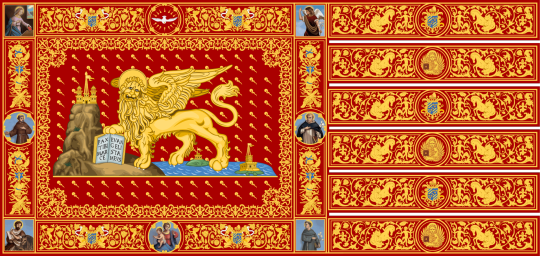
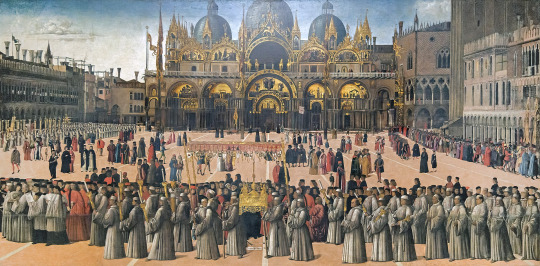
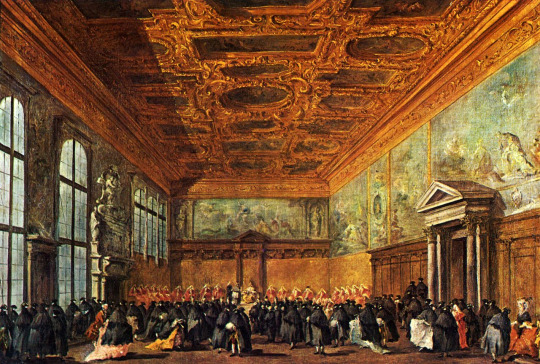
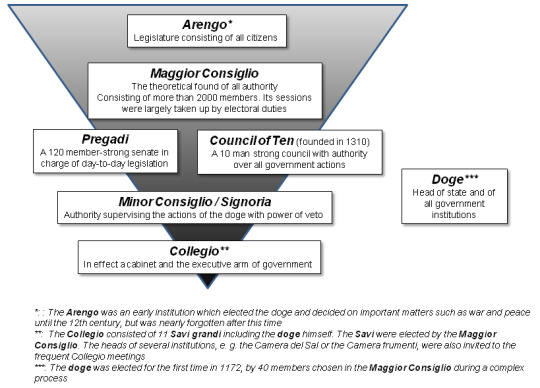
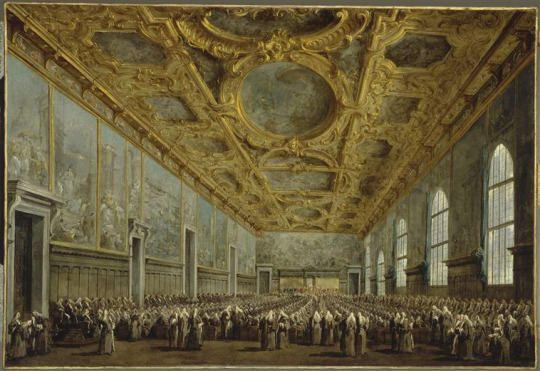
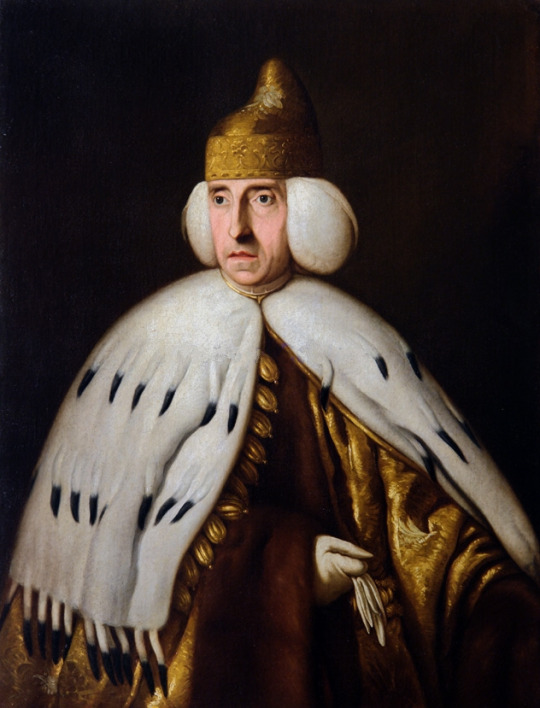
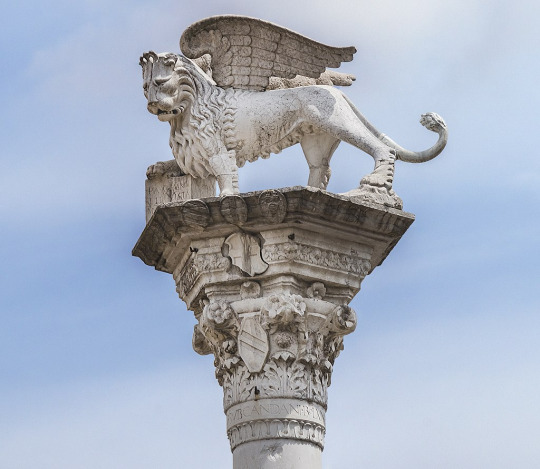

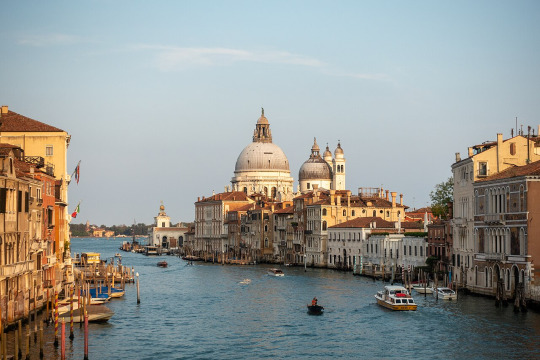
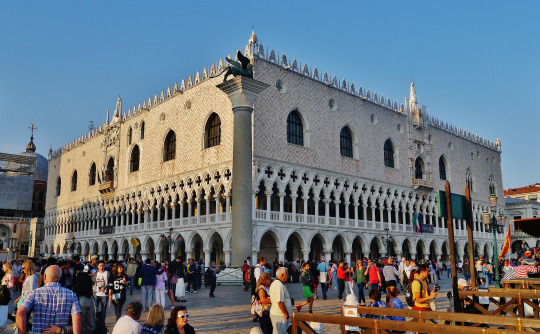
#military history#middle ages#venice#venetian republic#italy#politics#political history#trade#economics#governance#commerce#ottoman empire#spain#byzantine empire#napoleon#doge#republic
71 notes
·
View notes
Text
May 11, 2023
Earlier today, Pope Francis declared that 21 Coptic Orthodox Christians, who were beheaded by Islamic militants in Libya in 2015, would be added to the Roman Martyrology. Francis made the announcement during an audience with Pope Tawadros II, the leader of the Coptic Orthodox Church of Alexandria. The “21 Coptic New Martyrs of Libya,” as they are called, were martyred on February 15, 2015. Less than a week later, they were declared saints in the Coptic Orthodox Church by Pope Tawadros. The Copts celebrate their feast on the anniversary of their death, February 15, and it appears that this will also be their feast day on the Roman calendar.
The world was shocked in February 2015, when a 5-minute video was uploaded to the internet by ISIS militants. The video showed the 21 kidnapped men in orange jumpsuits being beheaded on a beach near the Libyan city of Sirte. 20 of these martyrs were Egyptian Copts who had gone to Libya to do construction work. The last member of the group, Matthew Ayariga, was a fellow worker from Ghana. It is said that he told the executioners, “Their God is my God. I will go with them.” There has been some question over whether he was already Christian or whether the witness of his 20 coworkers led to his conversion, but nevertheless, his Christian witness and solidarity are inspiring. It was reported that as they died, they chanted hymns and prayed aloud.
The deaths of these men as Christian martyrs is undeniable. The extraordinary photos of Blessed Miguel Pro, a Catholic priest who was executed by the Mexican government in 1927 during the Cristero War — taken just moments before the he was shot by the firing squad — are perhaps the only other photographic images recording a Christian martyrdom as it happened. And yet the recognition of the 21 martyrs as Catholic saints is unprecedented for several reasons.
The primary reason, of course, is that the Coptic Orthodox Church is not in full communion with Rome. The Copts are Oriental Orthodox (as opposed to Eastern Orthodox), because they split from the other Christian churches in the year 451 at the Council of Chalcedon due to differences over the nature of Christ. They are also referred to as “Non-Chalcedonian Orthodox Churches.” This means that they recognize the first three ecumenical councils, whereas the Eastern Orthodox recognize seven, and the Catholic Church recognizes 21 ecumenical councils.
After more than 15 centuries, our hope of reunion may seem remote. After all these years, the two Churches have independently developed their own traditions, theologies, forms of worship, and prayers. Yet some things have remained the same. Both Churches have maintained apostolic succession and the sacraments: Pope Francis is the successor of St. Peter and Pope Tawadros is the successor of St. Mark. In recent decades, the relationship between the Catholic Church and the Coptic Orthodox Church has become closer. For example, in 2017, Popes Francis and Tawadros made a joint statement indicating mutual acceptance of the validity of baptism in both Churches.
Pope Francis has praised the Martyrs of Libya many times, and today he recalled our shared baptism, as well as the blood of martyrs that enriches the Church. He said, “These martyrs were baptized not only in the water and Spirit, but also in blood, a blood that is the seed of unity for all of Christ’s followers.” In the past, the pope has discussed how we must realize that we, the baptized, have much more in common than what divides us. This shared recognition of sainthood between the two Churches is a significant step towards Christian unity.
This sets a new precedent. In 1964, when the Ugandan Martyrs were canonized by Pope Paul VI, St. Charles Lwanga and the other 21 Catholics among his companions were declared saints. The 23 Anglicans who were martyred alongside them were mentioned briefly in the pope’s homily, when he said, “And we do not wish to forget, the others who, belonging to the Anglican confession, met death for the name of Christ.”
Another reason why today’s announcement is unique was that Pope Francis did this by an official act. The Roman Martyrology is the official list of saints officially recognized by the Latin Church. Many Eastern Catholic Churches have their own processes for canonizing saints according to their traditions. Historically, when groups of Eastern Catholics have come into full communion with Rome, they will bring along their saints and prayers and traditions. Many of these saints aren’t officially canonized by Rome, and they are usually only venerated in their own tradition. By inscribing the names of these martyrs in the Roman Martyrology, Pope Francis has made it clear that these martyrs are to be venerated by Roman Catholics as saints.
Finally, in declaring them saints today, Pope Francis sidestepped the typical canonization process. They are saints, without having passed through the usual stages of Servant of God, Venerable, and Blessed. This “skipping” of steps is commonly referred to as “equipollent canonization.” Essentially, when a pope declares someone a saint by an official act, that person is recognized as a saint in the Church. This is not the first time Francis has moved a case along in this way. For example, when he canonized Popes John XXIII and John Paul II in 2014, he waived the requirement of a second miracle for John XXIII so that the two popes would be canonized on the same day. In 2013, he elevated the Jesuit Peter Faber, whose status had lingered at “Blessed” since 1872.
Perhaps the most interesting case is that of St. Gregory of Narek, an Armenian monk venerated as a saint in the Armenian Catholic Church and the Armenian Apostolic Church. Unexpectedly, Pope Francis named him the 36th Doctor of the Church in 2015. Living from in the mid-10th century through the early 11th, St. Gregory lived at a time when the Armenian Church was not in communion with Rome. After several failed attempts at reunion, the Armenian Catholic Church was officially recognized as an Eastern Catholic Church in 1742. Interestingly, the Armenian Catholic eparchy of Buenos Aires (established in 1989 by Pope John Paul II) is called the Eparchy of Saint Gregory of Narek. Perhaps this is how Pope Francis became familiar with the saint.
We Christians are blessed with a wide variety of saints from all sorts of backgrounds. They help make up the beautiful tapestry of the people of God — praying for us, interceding for us, and inspiring us. This is something worth celebrating.
21 Coptic New Martyrs of Libya, Pray for Us!
Mike Lewis. Bolded emphases added.
#Catholicism#Oriental Orthodox Christianity#Christianity#saints#martyrs#Libyan Martyrs#My Pope#Pope Tawadros II#Ugandan Martyrs#Miguel Pro
121 notes
·
View notes
Text
The Planets as Angels and Demons
In my tradition I work with planetary virtues by assigning them to days and hours in which certain works must be performed. As someone who also works in a Catholic context, I've assigned Angels and demons to embody the benefic and malefic aspects of these Planets. To me, an angel is not ruled by a planet, but is the planet itself. This is where anism comes into my practice. I acknowledge western occult classifications of angels and their planets, but I rework them to fit my own revelations instead of that according to old irrelevant wiccan men. That said, the 7 angels vs 7 demons lists across the world are heavily influenced by kabbalah. However my own list pulls from Greek Orthodox traditions and Philippino Catholic traditions based in Manila. I also allow the 3 books of occult philosophy to influence my worldview of these spirits and purposes. The 3 books of occult philosophy state that there is a benefic and malefic side to each planet. To copy this within my practice I assign one angel and one demon to a planet. I come to them not in ceremonial methods, but as folk saints.
The angels and their remedies are as followed:
Uriel- (sun/sunday) "regent of the sun" in folklore. He is known for being renowned, amiable, and acceptable; he adds potency in all good works, equaling a man to kings and princes, elevation to high fortunes, and success in all endeavors- I understand Michael as being the Sun in most traditions but I view micahel as being more war-minded and aligned with Mars. Uriel is historically referred to as regent of the sun and that should not be ignored.
Gabriel- (moon/monday) rendering the bearer grateful, amiable, pleasant, cheerful, and honored; removing malice and ill will, security during travel, increase of riches, bodily health, and the driving away of enemies and other evil things. - dreams, blessed pregnancy, prophecy of futures pertaining to spiritual paths and one's fate. Protector of families.
Michael-(mars/tuesday) potency in war, judgments, and petitions; victory against enemies, justice toward enemies for the sake of justice, not revenge. , and stopping of blood. Michael isncommonlynassociated with the color red and as mars is the" red planet" I saw it as fitting. Mars is described as our "sister planet" due to its similarities with earth. Given michael being so close and dear to humanity I saw this closeness and resemblance as representative of his love for us.
Raphael- (mercury/wednesday) rendering the bearer grateful and fortunate to do what they please, bringing gain, preventing poverty, and helping memory, understanding, and divination. He also encourages occult understanding through travel and reading signs given in nature. The protector of travelers and claims vengeance towards thieves.
Sealtiel- (jupiter/thursday) is often seen as the Patron Saint of prayer and worship for members of the Eastern Orthodox Church and some Catholic traditions. In some Orthodox traditions, he is said to help people interpret dreams, break addictions, protect children, preside over exorcisms, and rule over music in heaven. Orthodox Christians will seek his help if their prayer is suffering from distractions, inattentiveness, or coldness. In Catholic tradition, he is depicted with a thurible. He helps fight addiction, helps one seeking gains and riches, favor and love, peace, concord, appeasement of enemies, confirmation of honors, dignities, and counsels, and dissolving of enchantments. "The undoer of witchcraft" which is a title given to St Michael Archangel in traditions that don't recognize this angel.
Jehudiel- (venus/friday) ending concord, ending strife, procuring a woman's love traditionally but all genders apply. aiding in conception, working against barrenness, and causing spiritual abilities in a generation (or gifting a child with the power of prayer). also known for the dissolving of enchantments or lustful charms of a woman causing peace between men and women, making all kind of animals fruitful, protecting pets, curing melancholy, causing joyfulness, and bringing good fortune.
Barachiel-(saturn/saturday) the ability to bring forth, to make one safe, to make one's prayer powerful, and to cause a success of petitions with princes and powers. Marsilio Ficino and others also associated Saturn with intellectuals, whose minds are more lofty and divine than those of common folk. This is because Saturn is the highest planet in occult cosmology and therefore closest to God. this angel brings creativity, good study habits, focus, peace of mind and strengthens decision making skills to ensure good choices are made. -------
The Demons to be shared below are the traditional names of demons taken from Agrippa's 3 books of occult philosophy. It was common in older orthodox beliefs to associate the demons of the 7 deadly sins with the Planets, but I find the demons of the 7 deadly sins to be less influential and deadly than planetary powers would rival. Sin is on earth and changes as nature does. It's not written in the stars and predestined. Therefore, the 7 most well-known known demons on earth would not be fit to personify a planet. Expect a post on the 7 shortly.
After requesting the aide of these planetary demons, always cleanse the soul by prayer to the corresponding angel. Cursing another is similar to rolling in the mud yourself. Wash your hands as Caesar did. Without furthermore, here are the planetary demons that oppose these angels for matters of harming others:
Sorath(sun/sunday)- causing a man to be a tyrant, proud, ambitious, unsatisfiable, and to have an ill ending. Causes requested illness and can only be remedied by the corresponding angel.
Hasmodai- (moon/monday) rendering a location unfortunate and causing people to flee from it, hindering physicians, orators and all men whatsoever in their office. Blurs the psychic senses, hides works, ruins divination, curses divination tools to never work again.
Barzabel- (mars/Tuesday) hindering of buildings/homes, casting down the powerful from dignitaries, honors, and riches; causing discord, strife and hatred among men and beasts, chasing away bees, pigeons. and fish; hindering mills, rendering misfortune toward hunters and fighters, causing barrenness in men, women, and animals; striking terror into enemies, and compelling enemies to submit. Blighting of crops and all works money flows from.
Taphthartharath - (mercury/wednesday) rendering the bearer ungrateful and unfortunate in activities, encouraging poverty, driving away gains, and inhibiting memory, understanding, and divination. Steals spiritual gifts from others and gives them to the witch, can steal luck and good fortune of others. Hides the works of thieves, and protects stolen property from recovery.
Hismael- (jupiter/thursday) attract the baleful influences of Jupiter, of which Agrippa is curiously silent. However I am here with my own thoughts and experiences. This demon quite literally brings an end to the mind. It decays one's thoughts and happiness. It causes lunacy and mania. The hottest of the demons here.
Kedemel- (venus/friday) encouraging strife, driving away a woman's love, blocking conception, encouraging barrenness, blocking generational gifts and the blessing of ancestors, bringing bad luck, destroying joy, and encouraging melancholy. Ruins families, causes miscarriage, and attracts another's lover to you.
Zazel- (saturn/saturday) according to Agrippa includes the hindering of buildings and plantings i.e. growth, casting a man from honors and dignities, causing discord and quarrels, and dispersing armies. Turns one's men against him and creates jealousy. Ends the life of men.
Call on these spirits at your own risk. Always follow it with proper spiritual hygiene.
#folk witchcraft#traditional witchcraft#transgender witches#beginner witch#folk catholicism#animism#santa muerte#folkloric witchcraft#witchcraft#demons#demonology#angelology#grimoire
19 notes
·
View notes
Text
I Have Loved a Man so Much I Will Give Up my Soul
"Put not your trust in princes or in sons of men, in whom there is no salvation."
I am an Orthodox woman engaged to marry a Roman Catholic man. Relationships like these are allowed by both churches and happen with assumed frequency. These are usually only allowed when both people in the marriage respect (and ideally, Love) one another's religion. But my fiance does not Love my religion. He does not Love Orthodoxy. At best, he is indifferent and perhaps annoyed about it. When we go to my church, we have to drive a little farther, we have to stand longer, and we stay there later. It's annoying, to him. At worst, I find it hard to convince myself he does not hate Orthodoxy. He has scoffed during the liturgy. One time, during our creed, he practically shouted the filioque. He stews and refuses to participate in even the simple gestures.
The opinions he expressed on social media are even crueler. He sees the rape of Hagia Sophia as repayment and punishment for the schism. He sees all oppression of Christians in the Middle East as a punishment for the schism (I am Middle Eastern). He hates Saint Justinian and will never stop letting me know it. He openly thinks our scholars and mystics are silly.
He refuses to defend me against slander by his friends in public. His friends call me a heretic to my face, when that is an opinion explicitly condemned by the theology of their own church.
I know when I marry him and have children with him, they will grow up EC, at best. They will hate my religion because of their father. I will grow farther and farther away from the Orthodox Church.
Yet I cannot leave him. I Love him. I Love him more than my life. More than my soul, clearly. Every day, the pain grows greater. I keep getting visions of my life at forty, and it is filled with rage and depression. I have never Loved anyone more, especially one who has hurt me so thoroughly. But I know he is the only Love I am capable of having.
I wish I could become a nun.
#orthodox#orthodox christianity#orthodox christian#orthodox church#greek orthodox#jesus#russian orthodox#antioch#orthodox women#orthodox woman#orthodoxy#christian#christian girl#christian faith#christian blog#relationship#catholic#catholicism#catholic church#catholic coquette#catholic convert
10 notes
·
View notes
Note
I’ve been very curious about the history of the concept of sainthood in general, and I can really only find (often rad) histories of specific saints. Would you have any insight on how the idea of praying to specific people and not just god came to be popular or any book or article recommendations that go into it?
Hey! Great question, thank you.
Praying to saints is all about asking someone you feel pretty certain is in Heaven to pray to God on your behalf. People who have been officially canonized are people the Church has said, "This person is definitely in Heaven."
In the earliest days of Christianity, the people who were venerated in a way that we would later recognize as saints were martyrs. It was basically understood that martyrdom was an express ticket to Heaven, and so local cults (neutral, non-derogatory usage here) grew up around them. Shrines with their relics and so on.
After the first couple of centuries of Christianity, however, martyrdom became much less common, and so the stance softened to people who had suffered for the faith, and ultimately just people who were exemplary representatives of Christ, etc.
The process of canonization evolved over time and was codified in the early modern period into essentially what we have now, which is the tiered process based on number of verified posthumous miracles.
Here's a couple of articles that might help:
19 notes
·
View notes
Photo


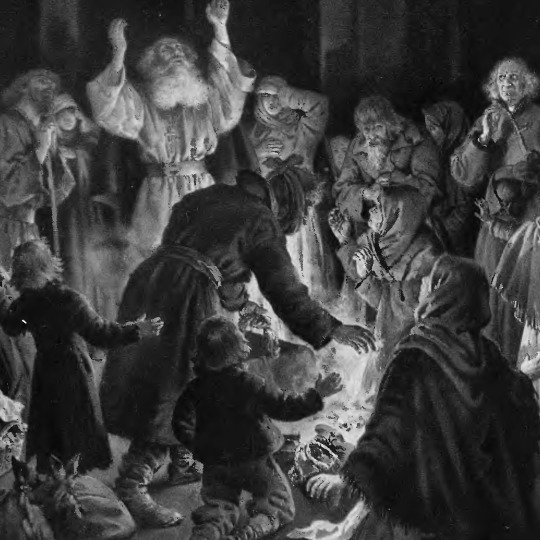
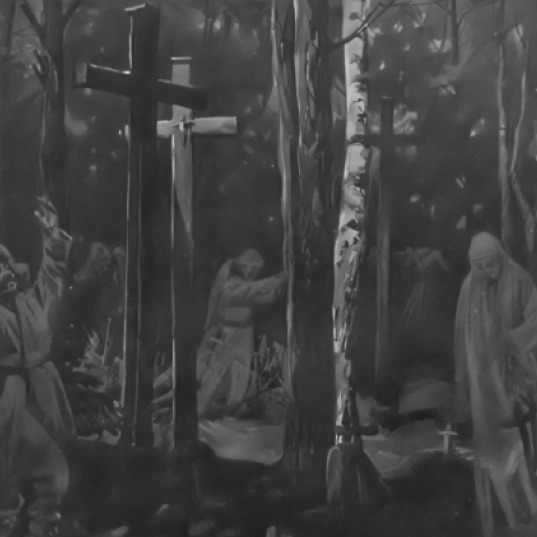
DZIADY
(literally "grandfathers, eldfathers" // sometimes translated as Forefathers' Eve)
• Belarusian — Dzyady
• Russian — Dedy
• Ukrainian — Didy
• Polish — Dziady
👻 A term in Slavic folklore for the spirits of the ancestors and a collection of pre-Christian rites, rituals and customs that were dedicated to them. The essence of these rituals was the "communion of the living with the dead", namely, the establishment of relationships with the souls of the ancestors, periodically returning to their headquarters from the times of their lives. The aim of the ritual activities was to win the favor of the deceased, who were considered to be caretakers in the sphere of fertility. The name "dziady" was used in particular dialects mainly in Poland, Belarus, Polesie, Russia and Ukraine (sometimes also in border areas, e.g. Podlachia, Smoleńsk Oblast, Aukštaitija), but under different other names (pomynky, przewody, radonitsa, zaduszki) there were very similar ritual practices, common among Slavs and Balts, and also in many European and even non-European cultures.
👻 Within the framework of grandfather's rituals, the souls coming to "this world" had to be hosted in order to secure their favour and at the same time help them to achieve peace in the hereafter. The basic ritual form was feeding and watering of souls (e.g. honey, groats, eggs, forge and vodka) during special feasts prepared in houses or cemeteries (directly on graves). A characteristic feature of these feasts was that the people who ate them dropped or poured some of their food and drinks on the table, floor or grave for the souls of the deceased. In some areas, however, the ancestors also had to be given the opportunity to bathe (a sauna was prepared for this) and warm up.This last condition was fulfilled by lighting fires, whose function is sometimes explained differently. They were supposed to light the way for wandering souls so that they would not get lost and could spend the night with their loved ones.
👻 In the Slavic tradition, depending on the region, the feast of the deceased was celebrated at least twice a year. The main dziady were the so-called spring dziady and autumn dziady:
• Spring dziady were celebrated around 1 and 2 May (depending on lunar phase).
• Autumn dziady were celebrated on the night from October 31 to November 1, also known as All Souls' Day, which was a preparation for the autumn day of the dead, celebrated around November 2.(depending on lunar phase).
👻 To this day, in some regions of eastern Poland, Belarus, Ukraine and part of Russia, it is cultivated to carry on the graves of the dead a symbolic meal in clay pots. The majority of Slavic neo-pagan and rodnover movements also cultivate the dziady.
👻 Christianity, on the one hand, fought against pagan rituals, successively banning them, and on the other hand, it tried to adapt some of them in an attempt to christianize them. In the case of the dziady, both the Catholic and the Orthodox Church tried to marginalize and then eliminate pagan festivals by introducing into their squares (at the same or similar moments of the annual cycle) Christian festivals and practices). In Poland it's All Saint's Day at November 1, which is celebrated by most Polish people instead of dziady.
#some ppl were interested in *slavic halloweeen*#Dziady#Halloween#slavic culture#slavic#slavs#pagan#slavic folklore#polish folklore#russian folklore#ukrainian folklore#poland#russia#belarus#ukraine#posted by me#🔮
166 notes
·
View notes
Text
06/11/2023 is Father's Day 👨👩👧👪👨👩👧🌏, World Jaguar Day 🐆🌏, Eastern Orthodox All Saints Day ☦🌏, National Corn on the Cob Day 🌽🇺🇲, National German Chocolate Cake Day 🇺🇲
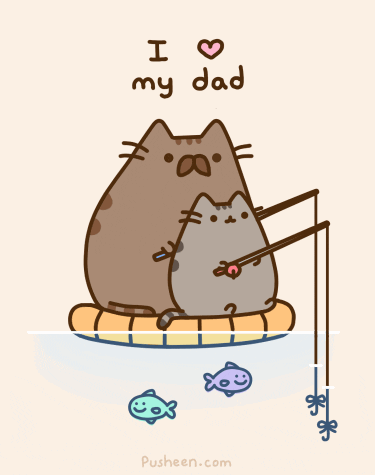
#father's day#world jaguar day#eastern orthodox all saints day#national corn on the cob day#national german chocolate cake day
0 notes
Text
Orthodox Christian Prayer Rules
FIRST DISCLAIMER: This is aimed at inquirers, or dvoverie practitioners who are not associated with a Church or spiritual father. If you are associated with a church and have a spiritual father, go to them, not me. There are 3 major components to a prayer rule in Eastern Orthodoxy: Proper Measure, Consistency, and Quality.
Proper Measure: a proper measure allows a person to grow both spiritually and earthly, you shouldn't over do your prayer rule, but you shouldn't be underdoing it either. Do not take on a long rule that you cannot reasonably achieve.
Consistency: you should always be consistent in prayer as this is the point of a prayer rule, always aim to 'pray without ceasing' (1 Thess. 5:17).
Quality: A quality prayer rule is always better than quantity. The quality of prayer is determined by the attention of the mind, and the depth of repentance in the heart. If prayer becomes a chore, or simply you reading from a page, you do not have a quality prayer rule.
Outline for Morning Prayer:
(this layout is mimicked for the evening prayers, the difference mainly comes from the difference in psalms)
NOTE: if you are dual faith, and wish to include prayers to other entities, I would insert them either before or after the Prayers to Saints
Introductory Prayers
One of the 6 morning Psalms:
Intercessions for the living and dead
Psalm 51
Doxology
Personal Dialogue with God
Prayers to Saints
Jesus Prayer
Dismissal Prayer
Introductory Prayers Suggestions
Begin with: 'In the name of the Father Son and the Holy Spirit. Amen Glory to you our God , Glory be to Thee!'
Choose any number of:
Prayer to Holy Spirit
Heavenly King, Comforter, the Spirit of Truth, present in all places and filling all things, Treasury of Goodness and Giver of life: come and abide in us. Cleanse us from every stain of sin and save our souls, O Gracious Lord.
Trisagion Prayer
Holy God. Holy Mighty. Holy Immortal Have mercy on us.(3)
Glory to the Father, and the Son and the Holy Spirit, both now and forever and to the ages of ages. Amen
All Holy Trinity, have mercy on us. Lord, forgive our sins. Master, pardon our transgressions. Holy One, visit and heal our infirmities, for the glory of Your Name.
Lord, have mercy.(3)
Glory to the Father, and the Son and the Holy Spirit, both now and forever and to the ages of ages. Amen
Lord's Prayer
Our Father,
Who art in Heaven, hallowed be Thy name.
Thy Kingdom come, Thy will be done, on earth as it is in Heaven.
Give us this day our daily bread; and forgive us our trespasses, as we forgive those who trespass against us; and lead us not into temptation, but deliver us from evil.
For Yours is the Kingdom and the Power and the Glory of the Father and the Son and the Holy Spirit, both now and forever and to the ages of ages. Amen.
Morning Psalms
Psalm 3
LORD, how they have increased who trouble me!
Many are they who rise up against me.
Many are they who say of me,
“There is no help for him in God.” Selah
But You, O LORD, are a shield for me,
My glory and the One who lifts up my head.
I cried to the LORD with my voice,
And He heard me from His holy hill. Selah
I lay down and slept;
I awoke, for the LORD sustained me.
I will not be afraid of ten thousands of people
Who have set themselves against me all around.
Arise, O LORD;
Save me, O my God!
For You have struck all my enemies on the cheekbone;
You have broken the teeth of the ungodly.
Salvation belongs to the LORD.
Your blessing is upon Your people.
Psalm 63
O LORD, do not rebuke me in Your wrath,
Nor chasten me in Your hot displeasure!
For Your arrows pierce me deeply,
And Your hand presses me down.
There is no soundness in my flesh
Because of Your anger,
Nor any health in my bones
Because of my sin.
For my iniquities have gone over my head;
Like a heavy burden they are too heavy for me.
My wounds are foul and festering
Because of my foolishness.
I am troubled, I am bowed down greatly;
I go mourning all the day long.
For my loins are full of inflammation,
And there is no soundness in my flesh.
I am feeble and severely broken;
I groan because of the turmoil of my heart.
Lord, all my desire is before You;
And my sighing is not hidden from You.
My heart pants, my strength fails me;
As for the light of my eyes, it also has gone from me.
My loved ones and my friends stand aloof from my plague,
And my relatives stand afar off.
Those also who seek my life lay snares for me;
Those who seek my hurt speak of destruction,
And plan deception all the day long.
But I, like a deaf man, do not hear;
And I am like a mute who does not open his mouth.
Thus I am like a man who does not hear,
And in whose mouth is no response.
For in You, O LORD, I hope;
You will hear, O Lord my God.
For I said, “Hear me, lest they rejoice over me,
Lest, when my foot slips, they exalt themselves against me.”
For I am ready to fall,
And my sorrow is continually before me.
For I will declare my iniquity;
I will be in anguish over my sin.
But my enemies are vigorous, and they are strong;
And those who hate me wrongfully have multiplied.
Those also who render evil for good,
They are my adversaries, because I follow what is good.
Do not forsake me, O LORD;
O my God, be not far from me!
Make haste to help me,
O Lord, my salvation!
Psalm 63
O God, You are my God;
Early will I seek You;
My soul thirsts for You;
My flesh longs for You
In a dry and thirsty land
Where there is no water.
So I have looked for You in the sanctuary,
To see Your power and Your glory.
Because Your lovingkindness is better than life,
My lips shall praise You.
Thus I will bless You while I live;
I will lift up my hands in Your name.
My soul shall be satisfied as with marrow and fatness,
And my mouth shall praise You with joyful lips.
When I remember You on my bed,
I meditate on You in the night watches.
Because You have been my help,
Therefore in the shadow of Your wings I will rejoice.
My soul follows close behind You;
Your right hand upholds me.
But those who seek my life, to destroy it,
Shall go into the lower parts of the earth.
They shall fall by the sword;
They shall be a portion for jackals.
But the king shall rejoice in God;
Everyone who swears by Him shall glory;
But the mouth of those who speak lies shall be stopped.
Psalm 88
1 O LORD, God of my salvation,
I have cried out day and night before You.
2 Let my prayer come before You;
Incline Your ear to my cry.
For my soul is full of troubles,
And my life draws near to the grave.
I am counted with those who go down to the pit;
I am like a man who has no strength,
Adrift among the dead,
Like the slain who lie in the grave,
Whom You remember no more,
And who are cut off from Your hand.
You have laid me in the lowest pit,
In darkness, in the depths.
Your wrath lies heavy upon me,
And You have afflicted me with all Your waves. Selah
You have put away my acquaintances far from me;
You have made me an abomination to them;
I am shut up, and I cannot get out;
My eye wastes away because of affliction.
LORD, I have called daily upon You;
I have stretched out my hands to You.
Will You work wonders for the dead?
Shall the dead arise and praise You? Selah
Shall Your lovingkindness be declared in the grave?
Or Your faithfulness in the place of destruction?
Shall Your wonders be known in the dark?
And Your righteousness in the land of forgetfulness?
But to You I have cried out, O LORD,
And in the morning my prayer comes before You.
LORD, why do You cast off my soul?
Why do You hide Your face from me?
I have been afflicted and ready to die from my youth;
I suffer Your terrors;
I am distraught.
Your fierce wrath has gone over me;
Your terrors have cut me off.
They came around me all day long like water;
They engulfed me altogether.
Loved one and friend You have put far from me,
And my acquaintances into darkness.
Friday - Psalm 103
Psalm of David.
1 Bless the LORD, O my soul;
And all that is within me, bless His holy name!
2 Bless the LORD, O my soul,
And forget not all His benefits:
3 Who forgives all your iniquities,
Who heals all your diseases,
4 Who redeems your life from destruction,
Who crowns you with lovingkindness and tender mercies,
5 Who satisfies your mouth with good things,
So that your youth is renewed like the eagle’s.
6 The LORD executes righteousness
And justice for all who are oppressed.
7 He made known His ways to Moses,
His acts to the children of Israel.
8 The LORD is merciful and gracious,
Slow to anger, and abounding in mercy.
9 He will not always strive with us,
Nor will He keep His anger forever.
10 He has not dealt with us according to our sins,
Nor punished us according to our iniquities.
11 For as the heavens are high above the earth,
So great is His mercy toward those who fear Him;
12 As far as the east is from the west,
So far has He removed our transgressions from us.
13 As a father pities his children,
So the LORD pities those who fear Him.
14 For He knows our frame;
He remembers that we are dust.
15 As for man, his days are like grass;
As a flower of the field, so he flourishes.
16 For the wind passes over it, and it is gone,
And its place remembers it no more.
17 But the mercy of the LORD is from everlasting to everlasting
On those who fear Him,
And His righteousness to children’s children,
18 To such as keep His covenant,
And to those who remember His commandments to do them.
19 The LORD has established His throne in heaven,
And His kingdom rules over all.
20 Bless the LORD, you His angels,
Who excel in strength, who do His word,
Heeding the voice of His word.
21 Bless the LORD, all you His hosts,
You ministers of His, who do His pleasure.
22 Bless the LORD, all His works,
In all places of His dominion.
Bless the Lord, O my soul!
Psalm 143
Hear my prayer, O LORD,
Give ear to my supplications!
In Your faithfulness answer me,
And in Your righteousness.
Do not enter into judgment with Your servant,
For in Your sight no one living is righteous.
For the enemy has persecuted my soul;
He has crushed my life to the ground;
He has made me dwell in darkness,
Like those who have long been dead.
Therefore my spirit is overwhelmed within me;
My heart within me is distressed.
I remember the days of old;
I meditate on all Your works;
I muse on the work of Your hands.
I spread out my hands to You;
My soul longs for You like a thirsty land. Selah
Answer me speedily, O LORD;
My spirit fails!
Do not hide Your face from me,
Lest I be like those who go down into the pit.
Cause me to hear Your lovingkindness in the morning,
For in You do I trust;
Cause me to know the way in which I should walk,
For I lift up my soul to You.
Deliver me, O LORD, from my enemies;
In You I take shelter.
Teach me to do Your will,
For You are my God;
Your Spirit is good.
Lead me in the land of uprightness.
Revive me, O LORD, for Your name’s sake!
For Your righteousness’ sake bring my soul out of trouble.
In Your mercy cut off my enemies,
And destroy all those who afflict my soul;
For I am Your servant.
Intercessions for the living and dead (There are many to choose from, this is my favourite)
Lord, we pray for peace in the world.
For all the faithful and Orthodox Christians.
For our Archbishop (name), our Bishop (name), and all our brothers and sisters in Christ. (If you are part of a church)
For our parents, our brothers and sisters, our children, our relatives and friends, and all people.
For those who hate us and those who love us. For those who work with us and those who serve us.
For those who have asked us, unworthy as we are, to pray for them.
For travelers by land, sea and air. For prisoners and captives.
For those who are hungry, those who are suffering, and those who are sick.
For those departed from this life in the hope of the resurrection.
Through the prayers of our holy Fathers, Lord Jesus Christ, have mercy on us and save us. Amen.
Psalm 50
Have mercy upon me, O God, according to Your lovingkindness; according to the multitude of Your tender mercies, blot out my transgressions.
Wash me thoroughly from my iniquity, and cleanse me from my sin.
For I acknowledge my transgressions, and my sin is ever before me.
Against You, You only, have I sinned, and done this evil in Your sight that You may be found just when You speak, and blameless when You judge.
Behold, I was brought forth in iniquity, and in sin my mother conceived me.
Behold, You desire truth in the inward parts, and in the hidden part You will make me to know wisdom.
Purge me with hyssop, and I shall be clean; wash me, and I shall be whiter than snow.
Make me to hear joy and gladness, that the bones which You have broken may rejoice.
Hide Your face from my sins, and blot out all my iniquities.
Create in me a clean heart, O God, and renew a steadfast spirit within me.
Do not cast me away from Your presence, and do not take Your Holy Spirit from me.
Restore to me the joy of Your salvation, and uphold me with Your generous Spirit.
Then I will teach transgressors Your ways, and sinners shall be converted to You.
Deliver me from blood-guiltiness, O God, the God of my salvation, and my tongue shall sing aloud of Your righteousness.
O Lord, open my lips, and my mouth shall show forth Your praise.
For You do not desire sacrifice, or else I would give it; You do not delight in burnt offering.
The sacrifices of God are a broken spirit, a broken and a contrite heart –– these, O God, You will not despise,
Do good in Your good pleasure to Zion; build the walls of Jerusalem.
Then You shall be pleased with the sacrifices of righteousness, with burnt offering and whole burnt offering; then they shall offer bulls on Your altar.
Glory to the Father and to the Son and to the Holy Spirit, now and ever and unto ages of ages. Amen.
Doxology
Glory to God, Who has shown us the Light!
Glory to God in the highest, and on earth, peace, good will toward men!
We praise You! We bless You! We worship You!
We glorify You and give thanks to You for Your great glory!
O Lord God, Heavenly King, God the Father Almighty!
O Lord, the Only-Begotten Son, Jesus Christ, and the Holy Spirit!
O Lord God, Lamb of God, Son of the Father, Who take away the sins of the world, have mercy on us!
You, Who take away the sins of the world, receive our prayer!
You, Who sit on the right hand of God the Father, have mercy on us!
For You alone are holy, and You alone are Lord. You alone, O Lord Jesus Christ, are most high in the glory of God the Father! Amen!
I will give thanks to You every day and praise Your Name forever and ever.
Lord, You have been our refuge from generation to generation!
I said, "Lord, have mercy on me. Heal my Soul, for I have sinned against You!"
Lord, I flee to You. Teach me to do Your will, for You are my God. For with You is the fountain of Life, and In Your light shall we see light. Continue Your lovingkindness to those who know You.
Vouchsafe, O Lord, to keep us this day without sin.
Blessed are You, O Lord, the God of our fathers, and praised and glorified is Your Name for ever. Amen.
Let Your mercy be upon us, O Lord, even as we have set our hope on You.
Blessed are You, O Lord; teach me Your statutes.
Blessed are You, O Master; make me to understand Your commandments.
Blessed are You, O Holy One; enlighten me with Your precepts.
Your mercy endures for ever, O Lord! Do not despise the works of Your hands!
To You belongs worship, to You belongs praise, to You belongs glory: to the Father and to the Son and to the Holy Spirit, now and ever and unto ages of ages. Amen.
Personal Dialogue with God
Prayers to Saints
(Research prayers and Akathists to saints that you venerate)
Jesus Prayer
'Lord Jesus Christ, Have mercy on me, a sinner' x10, 33, 100, or 300
Dismissal Prayer
Most holy Theotokos, save us!
More honorable than the cherubim and more glorious beyond compare than the seraphim! Without corruption you gave birth to God the Word. True Theotokos, we magnify you!
Glory to You, O Christ, our God and our hope, glory to You!
Glory to the Father and to the Son and to the Holy Spirit, now and ever and unto ages of ages. Amen.
Lord, have mercy!
Lord, have mercy!
Lord, have mercy!
Through the prayers of our holy fathers, O Lord Jesus Christ, our God, have mercy on us and save us. Amen.
Outline for Evening Prayer:
Introductory Prayers
One of the 6 evening Psalms:
Intercessions for the living and dead
Psalm 51
Doxology
Personal Dialogue with God
Prayers to Saints
Jesus Prayer
Dismissal Prayer
Introductory Prayers Suggestions (same as morning prayers, use the same or different ones)
Evening Psalms
Psalm 103 (104)
Bless the Lord, O my soul!
O Lord my God, You are very great!
You are clothed with honor and majesty,
and cover Yourself with light as with a garment.
You have stretched out the heavens like a tent
and have laid the beams of Your chambers on the waters.
You make the clouds Your chariot
and ride on the wings of the wind.
You make the winds Your messengers,
and fire and flame Your ministers.
You have set the earth on its foundations
so that it should never be shaken.
You have covered it with the deep as with a garment;
the waters stood above the mountains.
At Your rebuke they fled;
at the sound of Your thunder they took flight.
The mountains rose, the valleys sank down
to the place which You appointed for them.
You set a bound which they should not pass
so that they might not again cover the earth.
You make springs gush forth in the valleys;
they flow between the hills,
they give drink to every beast of the field;
the wild donkeys quench their thirst.
By them the birds of the air have their habitation;
they sing among the branches.
From Your lofty abode You water the mountains;
the earth is satisfied with the fruit of Your work.
You have caused the grass to grow for the cattle,
and plants for people to cultivate,
that they may bring forth food from the earth,
and wine to gladden their heart,
oil to make their faces shine
and bread to strengthen their hearts.
The trees of the Lord are watered abundantly,
the cedars of Lebanon which He planted.
In them the birds build their nests;
the stork has her home in the fir trees.
The high mountains are for the wild goats;
the rocks are a refuge for the badgers.
You have made the moon to mark the seasons;
the sun knows its time for setting.
You have made darkness, and it is night,
when all the beasts of the forest creep forth.
The young lions roar for their prey,
seeking their food from God.
When the sun rises, they gather together
and lie down in their dens.
People go forth to their work
and to their labors until the evening.
O Lord, how manifold are Your works!
In wisdom have You made them all;
the earth is full of Your creatures.
Yonder is the sea, great and wide,
which teems with things innumerable,
living things both small and great.
There go the ships,
and Leviathan which You formed to sport in it.
These all look to You
to give them their food in due season.
When You give to them they gather it up;
when You open Your hand they are filled with good things.
When You hide Your face they are dismayed;
when You take away their breath they die and return to their dust.
When You send forth Your Spirit they are created;
and You renew the face of the earth.
May the glory of the Lord endure forever,
may the Lord rejoice in His works,
who looks on the earth and it trembles,
who touches the mountains and they smoke.
I will sing to the Lord as long as I live;
I will sing praise to my God while I have being.
May my meditation be pleasing to Him,
for I rejoice in the Lord.
Let sinners be consumed from the earth
and let the wicked be no more.
Bless the Lord, O my soul!
Praise the Lord!
Psalm 140 (141)
Lord I Call
Lord, I have cried unto Thee, hearken unto me. Hearken unto me, O Lord. Lord, I have cried unto Thee, hearken unto me; attend to the voice of my supplication, when I cry unto Thee. Hearken unto me, O Lord.
Let my prayer be set forth as incense before Thee, the lifting up of my hands as an evening sacrifice. Hearken unto me, O Lord.
Set a guard, O Lord, over my mouth; keep watch over the door of my lips.
Do not incline my heart to any evil thing, to practice wicked works with men who work iniquity; and do not let me eat of their delicacies.
Let the righteous strike me; it shall be a kindness. And let him reprove me; it shall be as excellent oil; let my head not refuse it. For still my prayer is against the deeds of the wicked.
Their judges are overthrown by the sides of the cliff, and they hear my words, for they are sweet.
Our bones are scattered at the mouth of the grave, as when one plows and breaks up the earth.
But my eyes are upon You, O GOD the Lord; in You I take refuge; do not leave my soul destitute.
Keep me from the snares which they have laid for me, and from the traps of the workers of iniquity.
Let the wicked fall into their own nets, while I escape safely.
Intercessions for the living and dead (same as morning)
Psalm 50 (same as morning)
Doxology (same as morning)
Personal Dialogue with God
Prayers to Saints
(Research prayers and Akathists to saints that you venerate)
Jesus Prayer
'Lord Jesus Christ, Have mercy on me, a sinner' x10, 33, 100, or 300
Dismissal Prayer (same as morning)
Prayers before and after Meals
Before Meals
In the name of the Father and the Son and the Holy Spirit. Amen.
The Lord’s Prayer
Our Father who art in heaven, hallowed be Thy name,
Thy kingdom come.
Thy will be done, on earth as it is in heaven.
Give us this day our daily bread;
and forgive us our trespasses, as we forgive those who trespass against
us;
and lead us not into temptation, but deliver us from evil.
Glory to the Father and the Son and the Holy Spirit, now and ever and
to the ages of ages. Amen.
Lord, have mercy. (3)
Christ our God, bless the food and drink of Your servants, for You are
holy always, now and ever and to the ages of ages. Amen.
After Meals
We thank You, Christ our God, that You have satisfied us with Your earthly
blessings. Deprive us not of Your heavenly kingdom. As You came among
Your disciples after the resurrection, O Savior, and gave them peace, come
also among us, grant us peace and save us. Amen.
Glory to You, Lord and King! You have gladdened our hearts through Your
earthly gifts. Fill us also with the gift of Your Holy Spirit, that we may
abound in every good work to the glory of Your name. Amen.
We thank You, Lord, Giver of all good things, for these Your gifts and all
Your mercies, and we bless Your holy name forever. Amen.
Ways to customise prayers before and after meals for dual faith practitioners
You can personalise these by invoking additional spirits/deities in the same prayers, such as:
'Christ our God, Hestia the Blessed of the hearth, bless the food and drink of Your servants, for You are holy always, now and ever and to the ages of ages. Amen.'
This is an example for a dual-faith practitioner combining Hellenic Polytheism and Orthodox Christianity, but this could be altered for any other spirit to be invoked.
#orthodox christianity#orthodox church#greek orthodox#prayer#prayer rule#greek orhtodox#mysticism#christianity#russian orthodox#icons#prayers#triasgon#christian#jesus#bible#psalms#psalm 23#psalm 86#psalm 91#a psalm for the wild built#faith#scripture#religion#dual faith#dvoverie#folk practitioner#folk practice#folk music
7 notes
·
View notes
Text
Praying the Rosary, an Eastern Orthodox way
As a culturally Irish and Roman Catholic who converted to Eastern Orthodoxy I still feel quite close to the rosary and I feel it’s still a part of me. I firmly believe that cultural practices can be preserved even after conversion and thus I’ve created this small guide on how I personally pray the rosary as an Eastern Orthodox Catholic. Of course this is not the only way to pray the rosary as an Orthodox Christian and nor should it be! The Western Orthodox tradition often incorporates the rosary and the Eastern tradition of Roman Catholics do as well. The Eastern Orthodox saint, Seraphim of Sarov, even had his own version of a rosary prayer. All prayers listed below come directly from the “Jordanville Prayer Book” and it is important to note that I do not recite/contemplate any of the “mysteries” and conform to the “non-imaginative” form of Orthodox prayer. I also pray in a loop meaning I start and end with “The Apostle’s Creed” (then a sign of the cross) but that’s just a personal preference. This is my personal creation I wished to share and is not official in anyway, nonetheless I hope this guide benefits you in some small way, may your prayers be blessed.
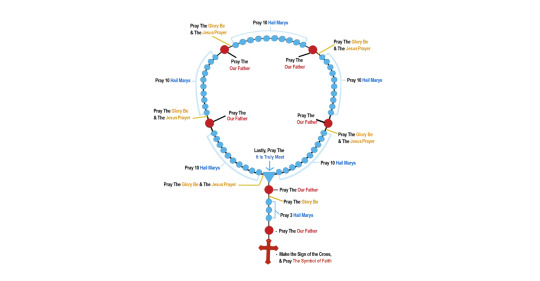
“The Apostles Creed” or, “The Symbol of Faith”
I believe in one God, the Father Almighty, Maker of heaven and earth, and of all things visible and invisible. And in one Lord Jesus Christ, the Son of God, the Only-begotten, begotten of the Father before all ages; Light of Light; true God of true God; begotten not made; of one essence with the Father; by Whom all things were made; Who for us men, and for our salvation, came down from the heavens, and was incarnate of the Holy Spirit and the Virgin Mary, and became man; And was crucified for us under Pontius Pilate, and suffered, and was buried; and arose again on the third day according to the Scriptures; and ascended into the heavens, and sitteth at the right hand of the Father; And shall come again, with glory, to judge both the living and the dead; Who’s kingdom shall have no end. And in the Holy Spirit, the Lord, the Giver of Life; Who proceedeth from the Father; Who with the Father and the Son together is worshiped and glorified; Who spake by the prophets. In One, Holy, Catholic, and Apostolic Church. I confess one baptism for the remission of sins. I look for the resurrection of the dead, And the life of the age to come. Amen.
“The Our Father”
Our Father, Who art in the heavens, hallowed be Thy name. Thy kingdom come, Thy will be done, on earth as it is in heaven. Give us this day our daily bread, and forgive us our debts, as we forgive our debtors; and lead is not into temptation, but deliver us from the evil one.
“The Hail Mary” or, the “Song to the Most Holy Theotokos”
O Theotokos and Virgin, rejoice, Mary, full of grace, the Lord is with thee, blessed art thou among women, and blessed is the Fruit of thy womb, for thou hast borne the Saviour of our souls.
“The Glory Be”
Glory to the Father, and to the Son, and to the Holy Spirit, both now and ever, and unto ages of ages. Amen.
“It Is Truly Meet” (replacing the “Hail Holy Queen”)
It is truly meet to bless thee, the Theotokos, ever-blessed and most blameless and Mother of our God. More honorable than the Cherubim, and beyond compare, more glorious than the Seraphim; who without corruption gavest birth to God the Word, the very Theotokos, thee do we magnify. Amen.
Although I never used it before converting, if you feel the need; “The Jesus Prayer” (perhaps using the plural) can be used in place of the “Fatíma Prayer”
Lord Jesus Christ, Son of God, have mercy on me a sinner/we sinners.
#not offical AT ALL!#prayers#information#Eastern Orthodox Catholic#rosary#orthodox#orthodox christianity#eastern orthodox#personal#guides
71 notes
·
View notes
Text

Saint Buddha: How the Awakened One became a Christian saint
By Tracy Cochran
July 31, 2024
For about a thousand years, the Buddha was revered as a Christian saint. From the eighth century onward, the legend of St. Josaphat, as the Buddha was known, was told and retold throughout the Christian East, Africa, Europe, and Britain. The story of the Buddha was greatly beloved by all kinds of Christians, from peasants to popes. Feast days dedicated to St. Josaphat, along with his spiritual teacher, who was called St. Barlaam, were included in the calendars of the Catholic, Greek Orthodox, and Eastern Orthodox churches. He and his teacher were celebrated with loving devotion and joy.
How could this be? And what meaning can it have for us? This ancient Saint Josaphat (another was named in the seventeenth century) seems to have been the end result of a long, fascinating game of telephone. In the telephone game, which most of us have played as children, a word or phrase–the more unusual or complicated the better–is whispered by one person to another until it emerges at the end of a chain of whispers altered in an unexpected and funny way. Laughter usually ensues, and a lesson follows: what we hear isn’t necessarily what was originally said. At some point, an adult will feel the need to spoil the fun by soberly reminding the tickled kids that this is how misunderstanding and gossip spreads.
The kids usually aren’t reminded that the transformation that comes with transmission can work a kind of magic. Everything we experience is filtered through the netting of our culture and conditioning. Transmitting religious ideas from country to country works a kind of alchemy, creating new alloys, adding layers of meaning. As the way of the Buddha and his enlightenment spread, it was expressed in new languages and forms. The vast cosmology and intricate philosophy of Sanskrit and Tibetan Buddhism became the poetic simplicity of Chan in China, Zen in Japan. Buddhism was–and is–adept at assimilating, incorporating the indigenous traditions of the cultures where it took root. In our own culture, the insights of the Buddha and especially the practice of mindfulness are often melded with the language and concepts of Western psychology and neuroscience.
But the shape-shifting of Buddha into Saint Josaphat was something else. The story of the Buddha seemed to vanish and reappear in Christian form. Scholars believe that a Sanskrit Mahayana Buddhist manuscript from the second to fourth century made its way east to China, and then west along that ancient trade route of goods and ideas known as the Silk Road. The story of the bodhisattva, the man who left a palace to gain enlightenment, struck a chord with the Manichees in Persia, and their Manichean version of the text was translated into an Arabic text. By 800 or 900 A.D. a Christianized version appeared in Georgian.
That version was translated into Greek and Latin, and from there, it caught fire. Versions of the tale appeared in French, Spanish, Armenian, Hebrew, Dutch, Icelandic, German, on and on. In the academic online journal The Conversation, Philip C. Almond, emeritus professor in the history of religious thought at the University of Queensland, writes that from the eleventh century onwards, the story of St. Josephat and his teacher St. Barlaam was more popular than any other legend. It was available in over sixty versions in the main languages of Europe, the Christian East, and Africa. Included among these texts was William Caxton’s 1483 English version of The Golden Legend, a popular collection of lives of the saints. There were several English versions of Saint Josaphat’s story, and one is the source of an anecdote that made its way into Shakespeare’s The Merchant of Venice—suitor asked to choose between three caskets chooses the lead of true commitment to love over the vain and greedy values of gold and silver.
What are we to make of this? Professor Almond rightfully sees this beloved story as proof of the influence Buddhism has had on the West. A thousand years before “mindfulness” became part of our vocabulary and daily lives, Western Christian culture cherished a man who gave up gold and silver to choose an ascetic path. His life was even used to defend Catholic monasticism during the Protestant Reformation.
But there is more to be seen. This story was welcomed as if it was already familiar. Long ago in India, a son was born to a king. This king was overjoyed at the birth of an heir but all too soon his happiness was shadowed by a troubling prophecy. An astrologer predicted that this child might choose a spiritual path, forsaking the pleasure and power that ruled his father’s world. The story drew people into a new understanding, but it was as if the melody was known deep in the bones.
To prevent his son from leaving, the king made his palace stronghold a luxurious prison, designed to shield the boy from the harsh truths of life, sickness, old age, and death. He surrounded his son with beautiful distractions that were updated as the boy grew older. But the young man found ways to escape the palace, and outside he glimpsed a blind man, a sick man, the reality of death and loss in its many guises. The shock he experienced rocked his world. He was in turmoil, burning to find a way to be in a world that was characterized by perpetual loss and change.
Those of us who know the story of Siddhartha Gautama, the Indian prince who became the Buddha, think we know what comes next. But here come strange differences. In this telling the ancient king is named Abenner, not Suddhodana. He is a proud man, devoted to pleasure, but he is portrayed as a pagan who persecuted the members of a Christian Church in his realm that was founded by the Apostle Thomas. (The Buddha, who was born in what is now Nepal, lived roughly five-hundred years before Jesus of Nazareth.)
In the midst of his spiritual crisis, Josephat meets Barlaam, a spiritual teacher from Sri Lanka. Some scholars believe that both names derive from the Sanskrit word bodhisattva, a being on the path to awakening. It was as if the Buddha was meeting himself in a more mature, more awakened state. In this version, however, Barlaam teaches Josephat about Christ, encouraging him to convert and live an ascetic Christian life.
Like Siddhartha’s father before him, Josephat’s father tries to sway his son from his quest and his destiny with beautiful maidens, offering every temptation. But Josephat, like Siddhartha, cannot be tempted. Here versions vary. According to Professor Almond, Josephat goes in search of Barlaam in Sri Lanka, after his father’s death. He joins him in the mountains. In other accounts, Abenner himself is converted to Christianity. He abdicates his kingdom to his son and lives out his days as a hermit monk in the desert. Saint Josephat in turn gives up this worldly kingdom for a life of holy simplicity with his beloved teacher.
Despite the big changes in the story of Siddhartha, and despite the differences between various Christianized versions, a universal truth shines out. Life hurts. No matter how rich we are–no matter how zealously we pursue pleasure and avoid pain–suffering will find us. We will encounter change and loss in many forms, and ultimately death. For some of us, the impermanent nature of life is so haunting it impels us to seek answers beyond our own defenses. Both Siddhartha and his Christian double Josephat ventured beyond the palace walls. Out in the world, they both encountered sickness, aging, mortality. In his article in The Conversation, “How the Buddha Became a Christian Saint,” Professor Almond quotes Josephat telling us there was no going back: “No longer is there any sweetness in this transitory life now that I have seen these things…Gradual and sudden death are in league together.”
Both the Buddha and the saint discovered that real happiness is possible in this changing world. Peace and freedom wait for us outside the isolated little kingdoms of our anxious and defended lives. Both the Buddha and Saint Josaphat found a new life, a holy life, that was simple and direct. They surrendered their supposed riches, their status, and their stories to live in the light of a greater truth.
What is extraordinary is how ordinary this story is. What captivated Christians about the Buddha for a thousand years were not the many tales of magic and supernatural powers but a story about being willing to live in humble simplicity, open to reality. From his birth, the life of Siddhartha Gautama was full of evidence of special psychic powers and miraculous events. He always emphasized the magic of the Path, proclaiming that compared to it special states and miracles were mere magic tricks. Based on his story, Sain Josaphat agreed.
But miraculous events did abound in Siddhartha’s life. It is said that the moment he was born he rose and took seven steps and spoke, proclaiming that this would be his last birth. Wherever he stepped a lotus bloomed. As a boy, he was taken by the king to a nearby village to watch a plowing festival. Left alone under a tree when his nannies thought he was sleeping, the little prince sat up and took in his first impressions of the co-existence of joy and suffering–the joy of a beautiful day and peaceful, mindful solitude, the suffering of the laboring men and oxen, of the plowed-up worms and insects carried away and eaten by birds.
All day long as the boy sat and observed (in some accounts he slept), a shadow cast by the tree sheltered him. Miraculously, even as the sun moved, the shadow never moved. When Siddhartha left home to seek enlightenment, he took off his princely robes and ornaments. He also cut his long hair, tossing his hair knot into the air, asking the universe to not let it fall if he was indeed to become a Buddha. It never fell. After he abandoned ascetic practice to meditate and seek insight on his own, he accepted a meal of rice pudding from a village girl named Sujata. When he finished eating, he hurled the bowl into the river, asking that it flow upstream if he was to attain enlightenment. It flowed upstream.
After the Buddha attained enlightenment, these auspicious miraculous events were accompanied by tales of his extraordinary psychic powers, cultivated during meditation. While it was (and is) considered unskillful and unseemly to flaunt such capacities, stories of the Buddha’s telepathy and ability to levitate and teleport and more are cherished in the literature. From the moment he returned to Kapilivastu, his home kingdom, after his enlightenment, people witnessed the Buddha levitating and making it rain or, in the case of a famous teaching in Savatti, making jeweled walkways in the air and cosmic light shows that included duplicates of himself in different poses. He subdued great serpents and drunken elephants, and outran a monstrous killer, Anguilmala, while walking slowly and calmly (in some versions of that story the Buddha is stretching the earth to maintain distance).
The list of marvels attributed to the Buddha is long and vivid. Yet none of that makes its way into the story of Saint Josephat. One explanation is that the manuscript that made its way along the Silk into receptive hands simply didn’t include such things. Another possibility is that what proved indelible was what was most relatable. The real magic in the story of Siddhartha and Josaphat consisted in their breaking free and finding a way to live with that peace and freedom in a real world.
It is a wondrous feat that the bodhisattva was worshiped as a Christian saint for so long, but there was a kind of curious time lag at play. Until the nineteenth century, Buddhism wasn’t known as a distinct religion in the West. There were just glimpses of an extraordinary being. One of the manuscripts of the man we know as Marco Polo includes a description of “Sakyamuni Burkham” (his rendering of Shakyamuni Buddha), a saintly being who lived a good and pure life. Indeed Marco and at least one other translator of his manuscripts wrote of the remarkable similarity between this man and Saint Josephat.
Even as Buddhist teachings were translated and became known they were often misunderstood–even by brilliant thinkers, and even by Pope John Paul II, who is now a canonized saint himself. The Buddha’s enlightenment struck the late pontiff and many Christians as morbid, based on a realization that the world was evil and a source of suffering. Yet in his collection of essays, Crossing the Threshold of Hope, Pope John Paul describes the Buddha as negative, characterized by “indifference with regard to the world.” The detachment from worldly identification and the humble way of living that inspired the legend of Saint Josaphat described apparently seemed to him and other Christian interpreters to be a deadening separation from life. The Buddha and his teaching seemed to lack all appreciation of the goodness of God and creation, and his great insight into non-separation seemed the very opposite of the generosity of Jesus Christ, who offers himself without beginning or end.
There were always exceptions. Meister Eckhart, Hildegard of Bingen, and other great mystics share insights that resonate deeply with the great insights of the Buddha. Many contemporary Christian thinkers, including the Trappist monk and author Thomas Merton, the Jesuit priest and Zen Roshi Robert Kennedy, and others have written with profundity and appreciation about the kinship between Buddhism and Christianity. Pope Francis has compared the work of Buddha and Jesus, both of them seeking to cultivate goodness by helping people escape from the cruel, separating little prisons of our egoism.
To be sure, there have always been plenty of Buddhists who see Christianity through a similarly biased lens–the current 14th Dalai Lama has ventured that Jesus Christ probably evolved over many lifetimes. As the saying goes, we don’t see people and things not as they are but as we are. But still, there are stories that slip through the net of our conditioning. At least, in the depths of the so-called “Dark Ages,” in the story of Saint Josephat, something very enlightened was understood.
To find the self, forget yourself, taught the great medieval Zen sage Dogen. Forget all your limiting stories and beliefs about who you are. Leave the little fortress of your defenses. Let go of riches and titles and come out into the open. Remember that you are part of life, not separate. Look, listen, sense, experience how it feels to be alive and part of great creation in this very moment, right here, right now. There is no greater magic than this.
We are heavily defended creatures. We can’t help this. We are wired this way. Healthy cells defend themselves against invaders. The ego defends us against psychic pain, and this too is natural. And yet we also long to connect with others and with life, to know and be known, to love and be loved. And we have learned by now that our defenses tend to be a little overactive. Once upon a time, we remember, we were open and loving and downright playful. We were radiant little babies. But thanks to myriad encounters during our time on earth, most of us have acquired a kind of psychic autoimmune disease. We get so triggered and so often consumed with our various defenses that we find ourselves mired in painful isolation that feels so much worse than the vulnerability we fear. What can help?
Attention. Hold everything that arises, including your trickiest defenses, in the light of a gentle, curious attention. Insight and freedom will come. It can feel like digging your way out of prison with a teaspoon, but just keep digging. Freedom will come. ◆
This piece is excerpted from the Fall 2024 issue of Parabola, THE WAY OF MAGIC.
6 notes
·
View notes
Text
RANTING ABOUT SAINT D. PETER (HAZBIN HOTEL)
The rant.

As a disclaimer, I am agnostic. As I am no longer Christian, it really doesn’t matter what I think about this. But I still want to share my thoughts, as I love hearing myself talk.
THIS IS GOING TO BLOW YOUR MIND, but Hazbin Hotel is a very anti-Christian show. I defend the right of creatives like Vivienne Me D. rano - a queer Latina woman - to criticize Christianity through their artwork. Christianity is the majority religion in America. I know this is a hard pill for a lot of Christians to swallow, but many forms of bigotry have been spread across the globe by Christianity. That being said, I do not respect shallow criticisms of Christianity. I am only interested in nuanced criticisms. I will defend the positive aspects of Christianity, and I do not want to deconvert any Christians with my fanworks.
(At that, I actually want people of all faiths to be able to engage with my weird fanfiction...not that this is necessarily recommended..!)
One of the most redeeming qualities of Christianity is the Biblical figures – especially, Jesus Christ and Mother Mary, but also the Apostles. Saint Peter – the Jewish fisherman who became one of Christ’s loyal Apostles and a leader of the early church – is one of the most important figures in the New Testament.
If St. Peter (Hazbin Hotel) was supposed to depict the actual Saint Peter, it is a horrendous portrayal and criticism is totally warranted! But to me, it is obvious that St. Peter (Hazbin Hotel) is not supposed to be Saint Peter at all.
As many have pointed out, St. Peter (Hazbin Hotel) is a completely different ethnicity from the actual Saint Peter. Although he is often portrayed as a Caucasian, the Biblical Saint Peter was actually Middle Eastern. One of the most ancient churches is the Ethiopian Orthodox Church; as such, their depictions of Biblical figures are often more ethnically accurate. This is a much more phenotypically accurate portrayal of St. Peter (and St. Paul) than most Americans are used to:

All these New Testament figures (including Jesus and Mother Mary) are Middle Easterners who would get profiled by airport security. Even in the time period they lived, they were ethnic minorities under the Roman empire.
St. Peter (Hazbin Hotel) isn’t just a white boy. This man is the blondest, blue-eyediest, whitiest white boy to ever white!! In all seriousness: While Jesus assembled followers from all walks of life, it is really unlikely that one of his closest followers would be blond and blue-eyed. Unless…Jesus was born in Scandinavia instead of the Middle East…?
HAZBIN HOTEL EXISTS IN AN ALTERNATE TIMELINE OF WORLD HISTORY WHERE JESUS D. CHRIST WAS SWEDISH!!!!!!!!!!!!!!!!!!!!!!!
Sorry, sorry…[clears throat] St. Peter (Hazbin Hotel) isn’t just the wrong race! Everything about him is just…not Saint Peter!
Saint Peter is often portrayed as an old man. But the TV series The Chosen has one of the more accurate portrayals of a young Saint Peter:

Admittedly, he would not have looked like this much of a pretty boy, and he would have had less Eurocentric features. But this portrayal is accurate, in showing his Middle Eastern heritage and ruggedness. It is clear that Dallas Jenkins valued Biblical accuracy, and he deserves praise for this! (seriously…The Chosen is an outstanding modern adaptation of the New Testament…!) Saint Peter was a poor, hardworking fisherman. He was also a minority under the Roman empire. Jesus Christ - a minority himself! - selected his followers from the margins and bottom of society, and empowered and defended the poor. This is one of the many redeeming qualities of The Messiah, and one of the reasons why Saint Peter is such an important Biblical figure.
Meanwhile… St. Peter (Hazbin Hotel) doesn’t look like he’s worked a day of physical labor in his entire life! He’s just this little Book of Mormon lookin twink!! Even if Hazbin Hotel does exist in an alternate timeline of world history where JESUS D. CHRIST was Swedish, a blond blue-eyed version of Saint Peter wouldn’t look like this! He’d still be a rugged, poor fisherman - not this little nerdy guy who looks like he died in the 21st century.
It is also implied that St. Peter (Hazbin Hotel) is queer…specifically pansexual, or maybe bisexual. How much more obvious can it be that he’s not really Saint Peter? He’s the wrong race, physical build, AND sexuality!!
(this is not to shit on St. Peter (hazbin hotel)...leave this man alone!!!)
I don’t know this for certain, but I just kind of assumed that Vivienne Me D. Rano is an ex-Christian, and that she created Hazbin Hotel to criticize the negative aspects of Christianity. Presumably, homophobia and racism would be among her chief criticisms. If this is true, there’s no way she isn’t aware of who Saint Peter actually was. His such an important figure to the New Testament, every church emphasizes his importance in the Gospels and Acts! Assuming Vivienne D. Medrano is an ex-Christian, the decision to portray St. Peter (Hazbin Hotel) as a pansexual blond blue-eyed twink must be a deliberate one. My interpretation is (1) This is her way of communicating that St. Peter (Hazbin Hotel) isn’t actually Saint Peter. He’s just some other guy named “Peter” (also a reason I don’t think Jesus D. Christ - and by extension, Mother Mary and the Apostles - exist in Hazbin Hotel…watch me be wrong about this…!). (2) Vivzie D. Pop is trying to tell a story where Heaven is corrupt. If Heaven is corrupt, it totally makes sense that it would be a majority white community. Assuming it's intentional, I really think this is smart criticism about the whitewashing of Biblical figures, and that this can be commentary on structural/institutional racism (e.g. zip code inequality) in the real world!
Still, I can see why this would bother Christians. If I was writing for the show, this is what I would do: Just show a brief scene with St. Peter wearing a little name tag. The name tag says “HELLO MY NAME IS SAINT PIETER”.
He’s Saint Pieter with an “i”. He’s not actually Saint Peter!
(Although if we get technical here, instead of changing his name you could just show his birth certificate and confirm that he was born with the name “Peter”... This makes it obvious that he’s an entirely different person, because the real life “Saint Peter” wasn’t actually named “Peter”! The Anglicization of the names of Biblical figures (e.g., Yeshua → Jesus) is arguably a form of whitewashing in itself– OH SHIT! I”m starting to go on another TEDx Talk. I REALLY like hearing myself talk!!)
3 notes
·
View notes
Text
Saints&Reading; Wednesday, April 10, 2024
march 27_april 10
VENERABLE HESYCHIUS OF JERUSALEM (C.408)

He was a priest-monk renowned in the Eastern Church as a theologian, biblical commentator, and preacher. He played a prominent role in the 5th-century controversy on the nature of Christ and was acclaimed as having annotated the whole of sacred Scripture.
Serving as a priest in the church in Jerusalem c. 412, Hesychius gained repute as a theologian and catechist so that by 429, he was recognized by chroniclers and the Orthodox Mēnologion (lives of the saints liturgically arranged by month) as the pre-eminent biblical interpreter and teacher of the church in Jerusalem and Palestine.
Most of Hesychius’ writings have been lost, although scholarship in the second half of the 20th century continues to identify more of his works hidden among Greek manuscripts and Latin translations. His biblical commentaries include interpretations of the Old Testament books of Leviticus, Job, Isaiah, and Ezekiel. A celebrated moralistic annotation on the Psalms that had long been attributed to the 4th-century spokesman for orthodoxy, Athanasius of Alexandria, is now acknowledged as Hesychius’. Some earlier commentaries of probable authenticity contain germinal terminology of the heterodox Nestorians.
As a biblical exegete, Hesychius generally followed the allegorical method of the 3rd-century Christian theologian Origen of Alexandria. Hesychius’ preoccupation with symbolism led him to deny that a literal meaning could be found for every sentence in the Scriptures. In order to avoid heretical interpretations of Scripture, he rejected such philosophical terms as person, essence, or substance to express doctrine on the nature of Christ. On this point, he allowed only the term logos sarkotheis (“the word made flesh”), a biblical concept. Against the diminution of Christ’s divinity by Arius and his Antiochene followers, he veered toward the view of the Monophysites.
Credited with the earliest known liturgical addresses on the Virgin Mary, Hesychius also wrote a church history after 428 that controverted Nestorianism and other heretical beliefs. This text was incorporated into the second Council of Constantinople proceedings in 553. The works of Hesychius were published in the series Patrologia Graeca, J.-P. Migne (ed.), vol. 27, 55, and 93 (1866).
Source: Encyclopedia Britannica
THE MONKMARTYR EUSTRATIUS OF THE KIEV NEAR CAVE (1096)

Martyr Eustratius of the Caves was born in the eleventh century at Kiev into a wealthy family. As an adult, he received monastic tonsure at the Kiev Caves monastery, after giving away all his possesions to the poor. Saint Eustratius humbly underwent obediences at the monastery, strictly fulfilling the rule of prayer and passing his days in fasting and vigilance.
In 1096 the Polovetsians captured Kiev and ravaged the monastery of the Caves, doing away with many of the monks. Saint Eustratius was taken into captivity, and was sold into slavery with thirty monastic laborers and twenty inhabitants of Kiev to a certain Jew living in Korsun.
The impious Jew tried to make the captives deny Christ, threatening to kill those who refused by starving them. Saint Eustratius encouraged and exhorted his brother Christians, “Brothers! Let none of us who are baptized and believe in Christ betray the vows made at Baptism. Christ has regenerated us through water and the Spirit. He has freed us from the curse of the Law by His Blood, and He has made us heirs of His Kingdom. If we live, we shall live for the Lord. If we die, we shall die in the Lord and inherit eternal life.”
Inspired by the saint’s words, the captives resolved to die of starvation, rather than renounce Christ, Who is the food and drink of Eternal Life. Exhausted by hunger and thirst, some captives perished after three days, some after four days, and some after seven days. Saint Eustratius remained alive for fourteen days, since he was accustomed to fasting from his youth. Suffering from hunger, he still did not touch food nor water. The impious Jew, seeing that he had lost the money he had paid for the captives, decided to take revenge on the holy monk.
The radiant Feast of the Resurrection of Christ drew near, and the Jewish slave owner was celebrating the Jewish Passover with his companions. He decided to crucify Saint Eustratius. The cruel tormentors mocked the saint, offering to let him share their Passover meal. The Martyr replied, “The Lord has now bestown a great grace upon me. He has permitted me to suffer on a cross for His Name just as He suffered.” The saint also predicted a horrible death for the Jew.
Hearing this, the enraged Jew grabbed a spear and stabbed Saint Eustratius on the cross. The martyr’s body was taken down from the cross and thrown into the sea. Christian believers long searched for the holy relics of the martyr, but were not able to find them. But through the Providence of God the incorrupt relics were found in a cave and worked many miracles. Later, they were transferred to the Near Caves of the Kiev Caves monastery.
The prediction of the holy Martyr Eustratius that his blood would be avenged was fulfilled soon after his death. The Byzantine Emperor issued a decree expelling all Jews from Korsun, depriving them of their property, and putting their elders to death for torturing Christians. The Jew who crucified Saint Eustratius was hanged on a tree, receiving just punishment for his wickedness.
Source: Orthodox Church in America_OCA

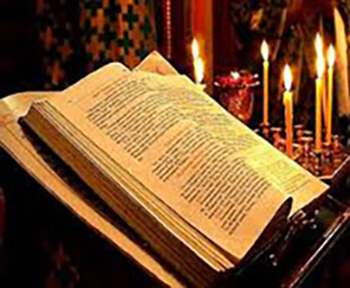
ISAIAH 26:21-27:9
21 For behold, the Lord comes out of His place To punish the earth's inhabitants for their iniquity; The earth will also disclose her blood, And will no longer cover her slain.
1 In that day the Lord with His severe sword, great and strong, Will punish Leviathan the fleeing serpent, Leviathan that twisted serpent; And He will slay the reptile that is in the sea. 2 In that day sing to her, “A vineyard of red wine! 3 I, the Lord, keep it, I water it every moment; Lest any hurt it, I keep it night and day. 4 Fury is not in Me. Who would set briers and thorns Against Me in battle? I would go through them, I would burn them together. 5 Or let him take hold of My strength, That he may make peace with Me; And he shall make peace with Me.” 6 Those who come He shall cause to take root in Jacob; Israel shall blossom and bud, And fill the face of the world with fruit. 7 Has He struck Israel as He struck those who struck him? Or has He been slain according to the slaughter of those who were slain by Him? 8 In measure, by sending it away, You contended with it. He removes it with His rough wind on the day of the east wind. 9
Therefore, by this, Jacob's iniquity will be covered; and this is all the fruit of taking away his sin: When he makes all the stones of the altar like chalkstones that are beaten to dust, wooden images and incense altars shall not stand.
GENESIS 9:18-10:1
18 Now the sons of Noah who went out of the ark were Shem, Ham, and Japheth. And Ham was the father of Canaan. 19 These three were the sons of Noah, and from these the whole earth was populated. 20 And Noah began to be a farmer, and he planted a vineyard. 21 Then he drank of the wine and was drunk, and became uncovered in his tent. 22 And Ham, the father of Canaan, saw the nakedness of his father, and told his two brothers outside. 23 But Shem and Japheth took a garment, laid it on both their shoulders, and went backward and covered the nakedness of their father. Their faces were turned away, and they did not see their father’s nakedness. 24 So Noah awoke from his wine and knew what his younger son had done to him. 25 Then he said: “Cursed be Canaan; A servant of servants He shall be to his brethren.” 26 And he said: “Blessed be the Lord, The God of Shem, And may Canaan be his servant. 27 May God enlarge Japheth, And may he dwell in the tents of Shem; And may Canaan be his servant.” 28 And Noah lived after the flood three hundred and fifty years. 29 So all the days of Noah were nine hundred and fifty years; and he died.
1 Now this is the genealogy of the sons of Noah: Shem, Ham, and Japheth. And sons were born to them after the flood.
#orthodoxy#orthodoxchristianity#easternorthodoxchurch#originofchristianity#spirituality#holyscriptures#bible#old testament#wisdom#saints
3 notes
·
View notes